Episodes
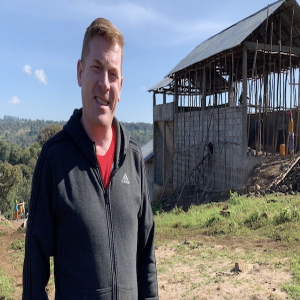
Saturday Oct 31, 2020
Episode 625: Ethiopia Ana Sora Washed
Saturday Oct 31, 2020
Saturday Oct 31, 2020
Ana Sora is a private farm owned by second-generation coffee farmer Israel Degfa. He grew up immersed in various aspects of the coffee industry as his father was a mill manager and his mum sold coffee in the local bus station to commuters. The estate is located in the Guji Zone, due East of Yirgacheffe. It’s western neighbour is Uraga and to the East is Adola - both places where Israel owns mills as well.
As coffee farms go, it's a very new farm: it was only formed in 2013. It's located at a whopping altitude of between 1,900 and 2,350 metres above sea level. It's a gorgeous but somewhat tiring walk to get there! (It's not all just holiday snaps, this coffee buying malarkey!)
We're now into our fifth wonderful year of roasting coffee from Ana Sora, and it's as exciting to see it return in 2020 as it was to roast it for the first time back in 2016! This coffee represents lots of time and energy working at the farmer's gate in Ethiopia, and it's one of the most unique coffees I've ever tasted.
My last visit to the farm was in December 2019 and I'm so pleased I was able to potter by and catch up with Israel before all this pandemic hoo-hah kicked off. Stevie Storytime 📕🙌... during my most recent trip we were driving together down a rough road that was part-way through being built when we blew out two tires at the same time. We had been travelling for 12 hours in the car and there wasn't a tyre shop anywhere nearby - so we got stuck in the middle of nowhere in the dark for three hours 😱 Thankfully one of the farm managers kindly drove out to us with a car which we took back to the house, and he slept in our car all night to keep an eye on it until the tyre shop opened. What a top bloke, he was our knight in shining armour!
It is unusual to find private farms of 250 hectares in Ethiopia (the norm being smallholder gardens of less than 2 hectares each) and even more unusual to find them at such high altitudes. Ethiopian coffee farms are high in general compared to other producing countries (mostly between 1700 - 2100 masl) but Ana Sora is on the higher side still, reaching as high as 2350 masl. The altitude helps with the slower maturation of the coffee cherry (owing in part to the generally lower temperatures and cooler nights) and allows more time for the plant to develop, which contributes to the super unique cup profile we see in coffees from Ethiopia.
Coffee growing is popular locally, and Israel also sources coffee from the surrounding area. Each washing station has around 1000-2000 members, each with one of the small home coffee plots typical of Ethiopia producing very small quantities. The area is populated by smallholder farmers who speak Oromife and are of Oromo ethnicity. Israel believes in helping these farmers through education in husbandry, and also through financial assistance.
Situated alongside the river Turo, the farm used to only produce naturally processed coffee. However, in 2018 the farmers decided to take advantage of the water source and built a washing station capable of producing washed coffee too, so TADAH ✨ here we have it!
This is a unique coffee from a unique relationship, and I'm massively excited to share it with you once again.
Up front is a hit of florals and sweet lemon, which the best Washed Yirgacheffes are known for. That sweet lemon gets a tropical edge as it's joined by persimmon, before swinging back into classic territory with a black tea like finish. Super unusual (and delicious) though is the aftertaste, where fresh raspberry kicks in.
- Country: Ethiopia
- Area: Guji zone
- Nearest town: Yirgacheffe
- Farm: Ana Sora
- Varietal: Indigenous wild varietals
- Processing: Washed
- Owner: Israel Degfa
- Founding year: 2013
- Altitude: 1,900–2,350 m.a.s.l.
- Farm size: 250 hectares, of which 150 hectares are coffee
CUPPING NOTES
Floral, sweet lemon, persimmon, black tea, raspberry
Clean cup: (1–8): 7
Sweetness: (1–8): 6.5
Acidity: (1–8): 6.5
Mouthfeel: (1–8): 6
Flavour: (1–8): 7
Aftertaste: (1–8): 8
Balance: (1–8): 6
Overall: (1–8): 7
Correction: (+36): +36
Total: (max. 100): 90
Roasting Information
Light to Medium - straight through first crack, keep it pretty quick and drop once you reach the gap.

Saturday Oct 24, 2020
Episode 624: Nicaragua Finca Limoncillo Pulped Natural Ethiosar
Saturday Oct 24, 2020
Saturday Oct 24, 2020
The story of Hasbean and Finca Limoncillo is a long and exciting one - we've been working together for 13 years now! A bakers' dozen of coffee harvests shared between Matagalpa and Stafford make us very happy customers. I've been telling the story of this relationship for many years now and I don't intend to stop any time soon because it's such a big, big, big relationship for me 🌟 So much of where we are today has come from this relationship. I'm really proud of everything that's happened in the past, and super excited for where we can go in the future.
Limoncillo (and a handful of other fantastic farms) are owned by Dr. Erwin Mierich. Having previously lived and worked in the USA, he returned to Nicaragua in the mid-1990s. He explained, "While I was living in the United States, I worked as a gynaecologist, but then I had to come back to Nicaragua and lead this farm. Coffee has been my passion since I was a little boy".
In the years we have worked together Erwin has visited Stafford many times, and it's always a pleasure to have him around. Last time he was visiting we ended up at a Weird Beard tap takeover in Manchester, talking to two Weird Beards about crazy brewing/coffee farming ideas! A coffee from Finca Limoncillo (the 'Funky Red Pacamara') is used in two of Weird Beard's beers: Black Perle and Double Perle, both of which are mighty delicious beers! A fitting collaboration to evolve from our continued business dealings when you consider how much time the family have dedicated to showing me how Latin American people like to party! On my very first visit to Nicaragua, the two people who showed me around were Erwin Jr and Steve Mierisch, the sons of the farmer. It was really cool, lifelong friends were made, and they taught me a lot about coffee production in the region.
Our relationship with Finca Limoncillo began in 2007, and back then we were buying their delicious coffee as part of a buying group. I cupped the coffee and instantly loved it - I knew I had to have it. It was a wonderful surprise to discover after the auction closed that it was owned by a family in Nicaragua who were already good friends of mine, and indeed probably the only people I knew from the whole country! The following year I visited the farm with our Nicaraguan importers and through my phenomenal Steve Pester Powers I got them to agree to bring the coffee into the UK for us (probably just to stop the flow of emails and phone calls from that annoying ginger bloke!)
A few years ago we were notified by the importers that they would not be buying the coffee again (for reasons other than the cup quality) which led to some frantic phone calls on my part, and a dig down the back of the sofa for enough loose change to fund buying 12 months' worth of coffee all in one go. There were many, many obstacles in the way of doing this deal, but we were lucky in that we were able to pull everything together in a very short amount of time. The upside of all of this is that we now work directly with Finca Limoncillo instead of going via anyone else. This coffee has gone from a one-off Cup of Excellence buy to a fantastic long-term relationship that I'm so very proud to have.
Finca Limoncillo is located in the Matagalpa region of Nicaragua and it's a whopping 171 hectares in size, which is heckin chonky! 109 hectares of this is used for coffee cultivation, with the remainder used to raise cattle and horses, and left to natural woodland. The family have heaps of policies and initiatives to make everything as sustainable as possible on this vast farming area: their use of chemicals is minimal, and the impact on the environment is always minimised by careful and considerate land management.
It's owned and run by the Mierisch family who are, by now, very close friends, and well-respected producers in Nicaragua. They're known for their experimental processing, varietal work, and exceptional coffee. The family employ over 3000 staff during the harvest, and at Limoncillo over 60 families live on the farm full time.
They are seriously loved by the guys who work for them, more than any other producer we buy from there is genuine love and respect between the family and their workers. The fact that the family are our friends helps us drill down into the details of what they do for the people who work for them. This information continues to prove to me that good people grow good coffee. My last visit was February this year (right before the world went into lockdown!) and it was truly memorable - myself and Joanna (of Drop Coffee fame) sat up with Eleane until 2 am chatting and drinking rum together... the farm visit the next morning was a very quiet one! Luckily Limoncillo is a beautiful location, it boasts nine waterfalls within the farm, which is exactly the sort of place you want to be when you've had too much fun with friends the night before.
On the farm, the family:
- The employers pay their staff 30% more than what is typical minimum wage, as well as:
- Provide free housing for 60 families on their farms
- Provide free electricity and running water for their homes
- Provide free food for all workers
- Have free daycare facilities for families to use
- Provide free health care facilities on the farms
- Employee on-site teachers who educate their staff and teach other skills such as pottery and weaving. The goal is to help staff diversify their skills. The teachers are also paid twice the wages they would receive in the cities.
This year we have purchased 9 phenomenal lots from Limoncillo (that meanie Roland wouldn’t let me buy as many as I wanted to!), which makes up a total of 21 from the Mierisch family's farms combined - 19 Nicaraguan and 2 Honduran.
Right then folks - it's time to learn all about Ethiosar! This coffee varietal is a stable hybrid plant, which is the result of lots of clever (and slightly convoluted, so bear with me) mixing of other coffee varieties. To make up a batch of Ethiosar we're going to need a pinch of Sudan Rume, a sprinkle of Timor, and a couple dashes of Villa Sarchi. Fun ingredients, right? A cross of Villa Sarchi (an improved Caturra from Costa Rica) and Timor (a mix of Robusta and Arabica varieties) makes a Sarchimor. That Sarchimor is then crossed with Sudan Rume (a very old Ethiopian variety), and the offspring of these plants is then crossed back once again with Villa Sarchi... all of that hard work and genetic back-and-forth results in the awesome Ethiosar!
Now some people will turn their noses up at the mention of Timor due to it's Robusta heritage, but Catimors (the name for the group of varieties made by crossing Timor with Caturra-based varities) are very useful. Through skilled breeding we can harness the practical aspects of Robusta (high yield, resistance to pests and disease, growth at lower altitudes) while still retaining the positive cup characteristics of Arabica varieties. Ethiosar has a very small percentage of Catimor in it, thus making it very resistant to leaf rust in most parts of the world. Both Sudan Rume and Villa Sarchi are known for their great cup characteristics.
What Ethiosar does is increase production by up to 40% whilst only needing 2,800 plants per manzana, whereas with Caturra you would need 4,000 plants. This may not seem important until you begin to think that each plant needs fertiliser. So not only are you getting more yield but it's cheaper to grow because you need less fertiliser and less plants (plants have to be grown or bought), and it's also quicker to pick. On top of all of this, it's super tasty.
This coffee immediately shouts chocolate bar to me - and in particular a Twix. There's loads of milk chocolate up front, but as it cools a little, you'll find plenty of caramel in there too, whilst the finish is where the biscuit comes in. There's a delicate green apple edge which works in perfect balance with the chocolate and caramel.
- Country: Nicaragua
- Municipality: Yasica Norte
- Region: Matagalpa
- Farm name: Limoncillo
- Producer: The Mierich family
- Farm size: 171 hectares
- Coffee growing area: 109 hectares
- Altitude: 1,200 m.a.s.l.
- Varietal: Ethiosar (Ricardo)
- Processing system: Pulped Natural
CUPPING NOTES
Milk chocolate, caramel, green apple.
Clean cup: (1–8): 6
Sweetness: (1–8): 7
Acidity: (1–8): 6
Mouthfeel: (1–8): 6
Flavour: (1–8): 7
Aftertaste: (1–8): 6
Balance: (1–8): 6.5
Overall: (1–8): 6.5
Correction: (+36): +36
Total: (max. 100): 87
Roasting Information
Medium-dark - just through to the first pops of second on the drop, no more. This one's tricky to judge as it's got a very loud crack and may need slightly more heat than you normally need to get to that point.

Saturday Oct 17, 2020
Episode 623: Kenya Kiriga Estate AA
Saturday Oct 17, 2020
Saturday Oct 17, 2020
The first coffee bush at Kiriga Estate was planted in approximately 1954 by colonial settlers. At about the same time, less than ten kilometres away along the same Kigio road, a young boy (Aloysius Gakunga, son of the chief for the larger Murang'a county) helped his father – Senior Chief Ndungíu Kagori – plant the first coffee seedling in the area. The area was known as Gaitegi village, Muranga Location 1 (Loco One). A love affair with coffee had been born!
Several years went by and the young boy grew up. He was riding his bicycle along Kigio road and, as he rode past the vast – by now well-established – coffee estates, he promised himself that he would one day own one of them.
He realized this dream in 1976.
The boy, or Mr A. N. Gakunga, sadly passed away in July 2014. By the time of his death, Mr Gakunga had passed his love of coffee and the mantle of Kiriga coffee estate on to Dr Brian Ndungíu Gakunga. Brian was his second child, and the eldest son out of his six children. According to Kikuyu cultural naming systems, Brian is named after Mr Gakungaís' father, who was both his grandfather and his pioneer coffee farmer.
- Dr Brian Gakunga is a coffee farmer who is well known in Kenyan coffee circles. He is a founding member and a former long-serving Honorary Secretary of the Kenya Coffee Producers Association, which is a national farmers' organisation that works to promote the economic and social interests of the coffee farmers through active participation in the national and international arena.
- Brian is also a former Board Member and Chairman of Transitional Exchange Committee (operationally, he was the then-Chairman of Nairobi Coffee Exchange), where over 90% of all of Kenya's coffee is currently sold. He's also currently the Founding Chairman of Africa Coffee Farmers' Network.
- Africa Coffee Farmers' Network represents the interests of coffee farmers, as spelt out in the organisation's core objective of improving the earnings of poor coffee farmers in order to break the vicious cycle of poverty. One way of doing this is by getting direct sales for the farmers.
Kiriga Estate sits between 1,550 and 1,650 metres above sea level. It is approximately five kilometres from Thika town, which is an industrial town in the central province of Kenya. It's four kilometres from Blue Posts hotel, which has the famous Chania and Thika falls. Thika lies 50 kilometres northeast of Nairobi.
Administratively, Kiriga coffee estate is in the Gatanga constituency of Muranga county, and it's separated from Kiambu county by the Chania river.
Kiriga coffee is predominantly SL28 variety (notable for its world-renowned cup quality). The farm has an estimated two hectares of Ruiru 11 variety (which has improved resistance to coffee berry disease and leaf rust); some K7 variety (similar characteristics as SL28, but with better resistance to leaf rust compared to SL28); and a field of the newest Batian variety. About 60% of the coffee that the estate produces is AA/AB.
Like any natural product, each coffee bean is different - some bigger, some smaller, some longer, some rounder...that's lead coffee buyers many years ago to begin separating the coffee by the size of the bean.
Throughout the world, this is done by screens - like a stack of flat colanders, with each layer having slightly smaller holes in it than the layer above. Whatever the smallest size a bean passes through, that’s it’s size. In most places, they’re named by 1/64th inch - so a screen 18+ means all the beans are 18/64th of an inch or bigger. Simple, right?
Well...in Kenya they use the same screens, but give them different names. An “AA” is screen 17 and 18, an “AB” is screen 16 and 15 and anything smaller (but still a whole bean) is a “C”. There’s one more class you might have tried - “PB” or Peaberry. That’s a bit different again, but it’s usually separated from the other beans because the round cross-section of a peaberry lets it pass through the holes of a screen easily.
We have AA, AB and C from Kiriga this year - so big beans, medium beans & little beans! You’ll also find quite a few peaberries in with the C (they didn’t separate them out into a different lot). Traditionally, the AA has got the highest prices (they’re about 15-20% of the crop), with AB being a bit cheaper and C going into commodity coffee. However, Brian from Kiriga sent us his C to try last year for the first time and we were wow-ed - it’s really sweet and nice - so we began buying it and are excited to be able to share it with you again, check it out here.
All coffee activities at Kiriga are carried out at a factory level, from the coffee nursery to all the farm operations (pruning, weed control, nutrition, irrigation, basin digging, disease control, infilling, mulching, and planting). Wet mill operations are also carried out on the factory level. Kiriga delivers both parchment coffee and Mbuni (naturals) to the commercial dry mill for milling and grading, in preparation for sale at coffee auctions and via indirect sale.
In addition to growing coffee the estate also has, I was told, shoats (sheep and goats), a dairy, and the potential to keep fish. It's all about diversity, and what's more diverse than a 'shoat'?! The estate is also occasionally visited by two hippos, in addition to some bird-life, while also being the home of a family of monkeys.
Kiriga irrigated all its coffee trees – despite the crippling electricity costs involved – during the dry season, in order to ensure their high standards were maintained despite the weather.
By the end of 2015, the estate had changed the cycle of its coffee trees by removing the old heads and growing new heads, which in return gave a higher yield of bold beans with the characteristic 'Kiriga coffee characteristics'. Over 40% of the 'old heads' had to go! This is way above the recommended 25%, and we expect to have decreased yield but increased quality as a result.
Many of the estate farms around Kiriga have been sold off to make housing estates. Whilst this is a challenge for the future, in the immediate period Brian is actually finding it helpful because there are more skilled pickers available (who were working on the other farms).
A delightful combination of blackberries and apples, this starts with juicy blackberries and blackcurrants. It's all got a sprinkling of soft dark sugar which will come to the fore as it cools, but on the finish and aftertaste is that green apple which balances the dark berries perfectly.
- Country: Kenya
- Constituency: Gatanga
- County: Muranga
- Nearest town: Thika
- Estate: Kiriga
- Farmer: Dr Brian Gakunga
- Altitude: 1,550–1,650 m.a.s.l.
- Varietals: SL28 AA & Ruiru 11 AA
- Processing method: Washed
CUPPING NOTES
Blackberry, blackcurrant, brown sugar, green apple
Clean cup: (1–8): 6.5
Sweetness: (1–8): 6.5
Acidity: (1–8): 7
Mouthfeel: (1–8): 6
Flavour: (1–8): 7
Aftertaste: (1–8): 6.5
Balance: (1–8): 6.5
Overall: (1–8): 7
Correction:(+36): +36
Total (max. 100): 89
Roast Information
Medium - through first and nicely into the gap, keeping the temperature going up fairly quickly to highlight the vibrant acidity. Finishing the roast just before second crack gets going.
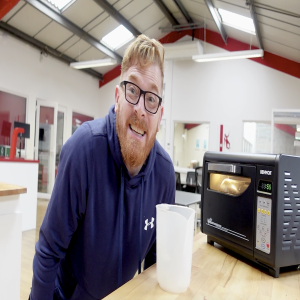
Saturday Oct 10, 2020
Episode 622: Kenya Kiriga Estate AB
Saturday Oct 10, 2020
Saturday Oct 10, 2020
The first coffee bush at Kiriga Estate was planted in approximately 1954 by colonial settlers. At about the same time, less than ten kilometres away along the same Kigio road, a young boy (Aloysius Gakunga, son of the chief for the larger Murang'a county) helped his father – Senior Chief Ndungíu Kagori – plant the first coffee seedling in the area. The area was known as Gaitegi village, Muranga Location 1 (Loco One). A love affair with coffee had been born!
Several years went by and the young boy grew up. He was riding his bicycle along Kigio road and, as he rode past the vast – by now well-established – coffee estates, he promised himself that he would one day own one of them.
He realized this dream in 1976.
The boy, or Mr A. N. Gakunga, sadly passed away in July 2014. By the time of his death, Mr Gakunga had passed his love of coffee and the mantle of Kiriga coffee estate on to Dr Brian Ndungíu Gakunga. Brian was his second child, and the eldest son out of his six children. According to Kikuyu cultural naming systems, Brian is named after Mr Gakungaís' father, who was both his grandfather and his pioneer coffee farmer.
- Dr Brian Gakunga is a coffee farmer who is well known in Kenyan coffee circles. He is a founding member and a former long-serving Honorary Secretary of the Kenya Coffee Producers Association, which is a national farmers' organisation that works to promote the economic and social interests of the coffee farmers through active participation in the national and international arena.
- Brian is also a former Board Member and Chairman of Transitional Exchange Committee (operationally, he was the then-Chairman of Nairobi Coffee Exchange), where over 90% of all of Kenya's coffee is currently sold. He's also currently the Founding Chairman of Africa Coffee Farmers' Network.
- Africa Coffee Farmers' Network represents the interests of coffee farmers, as spelt out in the organisation's core objective of improving the earnings of poor coffee farmers in order to break the vicious cycle of poverty. One way of doing this is by getting direct sales for the farmers.
Kiriga Estate sits between 1,550 and 1,650 metres above sea level. It is approximately five kilometres from Thika town, which is an industrial town in the central province of Kenya. It's four kilometres from Blue Posts hotel, which has the famous Chania and Thika falls. Thika lies 50 kilometres northeast of Nairobi.
Administratively, Kiriga coffee estate is in the Gatanga constituency of Muranga county, and it's separated from Kiambu county by the Chania river.
Kiriga coffee is predominantly SL28 variety (notable for its world-renowned cup quality). The farm has an estimated two hectares of Ruiru 11 variety (which has improved resistance to coffee berry disease and leaf rust); some K7 variety (similar characteristics as SL28, but with better resistance to leaf rust compared to SL28); and a field of the newest Batian variety. About 60% of the coffee that the estate produces is AA/AB.
Like any natural product, each coffee bean is different - some bigger, some smaller, some longer, some rounder...that's lead coffee buyers many years ago to begin separating the coffee by the size of the bean.
Throughout the world, this is done by screens - like a stack of flat colanders, with each layer having slightly smaller holes in it than the layer above. Whatever the smallest size a bean passes through, that’s it’s size. In most places, they’re named by 1/64th inch - so a screen 18+ means all the beans are 18/64th of an inch or bigger. Simple, right?
Well...in Kenya they use the same screens, but give them different names. An “AA” is screen 17 and 18, an “AB” is screen 16 and 15 and anything smaller (but still a whole bean) is a “C”. There’s one more class you might have tried - “PB” or Peaberry. That’s a bit different again, but it’s usually separated from the other beans because the round cross-section of a peaberry lets it pass through the holes of a screen easily.
We have AA, AB and C from Kiriga this year - so big beans, medium beans & little beans! You’ll also find quite a few peaberries in with the C (they didn’t separate them out into a different lot). Traditionally, the AA has got the highest prices (they’re about 15-20% of the crop), with AB being a bit cheaper and C going into commodity coffee. However, Brian from Kiriga sent us his C to try last year for the first time and we were wow-ed - it’s really sweet and nice - so we began buying it and are excited to be able to share it with you again, check it out here.
All coffee activities at Kiriga are carried out at a factory level, from the coffee nursery to all the farm operations (pruning, weed control, nutrition, irrigation, basin digging, disease control, infilling, mulching, and planting). Wet mill operations are also carried out on the factory level. Kiriga delivers both parchment coffee and Mbuni (naturals) to the commercial dry mill for milling and grading, in preparation for sale at coffee auctions and via indirect sale.
In addition to growing coffee the estate also has, I was told, shoats (sheep and goats), a dairy, and the potential to keep fish. It's all about diversity, and what's more diverse than a 'shoat'?! The estate is also occasionally visited by two hippos, in addition to some bird-life, while also being the home of a family of monkeys.
Kiriga irrigated all its coffee trees – despite the crippling electricity costs involved – during the dry season, in order to ensure their high standards were maintained despite the weather.
By the end of 2015, the estate had changed the cycle of its coffee trees by removing the old heads and growing new heads, which in return gave a higher yield of bold beans with the characteristic 'Kiriga coffee characteristics'. Over 40% of the 'old heads' had to go! This is way above the recommended 25%, and we expect to have decreased yield but increased quality as a result.
Many of the estate farms around Kiriga have been sold off to make housing estates. Whilst this is a challenge for the future, in the immediate period Brian is actually finding it helpful because there are more skilled pickers available (who were working on the other farms).
Starting off with a flash of bright grapefruit, the sweetness quickly comes in and it swings into a big mouthful of blood orange. The fruit flavours shift darker still with blackcurrant, which really fills out the aftertaste.
- Country: Kenya
- County: Muranga
- Constituency: Gatanga
- Nearest town: Thika
- Estate: Kiriga
- Farmer: Dr Brian Gakunga
- Altitude: 1,550–1,650 m.a.s.l.
- Processing method: Washed
- Varietals: SL28 AB & Ruiru 11 AB
CUPPING NOTES
Grapefruit, blood orange, blackcurrant
Clean cup: (1–8): 6.5
Sweetness: (1–8): 6
Acidity: (1–8): 7
Mouthfeel: (1–8): 6
Flavour: (1–8): 7
Aftertaste: (1–8): 7
Balance: (1–8): 6
Overall: (1–8): 7
Correction:(+36): +36
Total (max. 100): 88.5
Roast Information
Medium - through first and nicely into the gap, keeping the temperature going up fairly quickly to highlight the vibrant acidity. Finishing the roast just before second gets going.
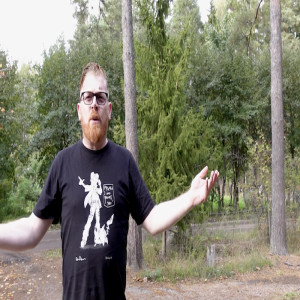
Saturday Oct 03, 2020
Episode 621: Costa Rica ARBAR El Manantial
Saturday Oct 03, 2020
Saturday Oct 03, 2020
When we found this farm for the very first time all the way back in 2013 we knew very little about it, so little in fact that the coffee didn't even have an official name! Back then all we knew was that the coffee was grown by a gentleman called Carlos Arrieta and it was really, really delicious! However, since then I've been lucky enough to visit Carlos on my trips to Costa Rica and, over the past few years, have found out lots more.
The farm is located in the Western Valley region near to the town of Lourdes de Naranjo. It's located at 1,600 meters above sea level and contains mostly Caturra, Catuai + a tiny bit of Villa Sarchi, there are also plans to plant some small micro-lots too in the future. El Manantial is actually one of Carlos's four farms...
- La Casa - mostly planted with Geisha and Kenya!
- La Isla - run by Maria’s niece and only just starting to produce coffee, it sits at 1,400 m.a.s.l. and 1.4 hectares in size, and is planted with Villa Sarchi, Kenya, Geisha and Ethiopia
- El Oasis - slightly smaller than El Manantial and produces around 6,000kg of fresh cherries each year
- El Manantial - around 3 hectares in size and produces around 8,500kg of fresh cherries each year (amounts to just over 1,000kg of green coffee when processed)
Carlos runs the farm with his wife and children, Maria Isabel, Yessica, Karen, Esteban and Jose Ignacio. He has owned this farm for almost twenty years but only started processing the coffee himself in 2014 (while still paying someone else to pulp it for him). He hadn't been able to present his coffee to a single buyer previously, so he would send it to the exporter we use in Costa Rica and, thankfully, that's how we found him!
The mill name "ARBAR" comes from the combined family names - Carlos ARietta and Maria BARboza - ARBAR. Their children are Yessica, Karen, Esteban & Jose Ignacio.
Carlos is very active in the local community and they have close relationships with their neighbours - which includes CoE winning mills like Herbazu, Vista Al Valle and Sumava. The farm operates mostly Organic processes, but they're not Organic certified. They believe in the value of biodiversity on the farms, and plants like fruit trees are positioned among the coffee plants to provide shade and to help the soil. These trees also provide food for the family. They even have a few sheep and other animals, with the farm being as self-sufficient as possible. They have one full-time employee, who lives on the farm.
When Carlos and his family started selling to us, it gave them a chance to
try new things; the prices that we pay gave them the opportunity to take bigger risks. One of the ways they did this was by trying small plantings of new varietals including Bourbon, Kenya (SL28) and Geisha which we saw some of for the first time last year and are really excited to welcome back again soon.
This coffee has been processed at the ARBAR micromill using the Red Honey process. Honey processing is somewhat similar to a Pulped Natural (but uses less water), falling somewhere in between a Washed and a Natural coffee both in terms of contact between the cherry mucilage and the bean during drying time and in the resulting flavour profile. The outer skin and fruit pulp is removed from the seed (bean) of the coffee inside, and it's left to dry. The colour in the name refers to the amount of sticky fruit that's left on the surface of the seed after depulping - darker indicates more / lighter indicates less. This method can present some risk of over fermentation during processing but water is a precious commodity in this area of Costa Rica, so this method suits the location very well. Carlos definitely has the skills to pay the bills though so no worries about mucking up the Honeys at ARBAR!
What hits me first in this coffee is loads of stone fruit sweetness. It’s all nectarines and greengages, with a lovely silky texture. On the finish, there’s a little waft of lemon wrapping it all up.
- Country: Costa Rica
- Region: Western Valley
- Town: Lourdes de Naranjo
- Farm: El Manantial
- Producer: Carlos Arrieta
- Micro mill: ARBAR
- Altitude: 1,600 m.a.s.l.
- Varietals: Caturra, Catuai & Villa Sarchi
- Processing system: Red Honey
CUPPING NOTES
Nectarine, greengage, lemon
Clean Cup: (1-8): 6.5
Sweetness: (1-8): 7
Acidity: (1-8): 6
Mouthfeel: (1-8): 6.5
Flavour: (1-8): 7
Aftertaste: (1-8): 6
Balance: (1-8): 6
Overall: (1-8): 7
Correction:(+36): +36
Total (max 100): 88
Roast Information
Medium - through first crack, let it develop a little in the gap but drop this before you get to second to preserve that fruit sweetness.
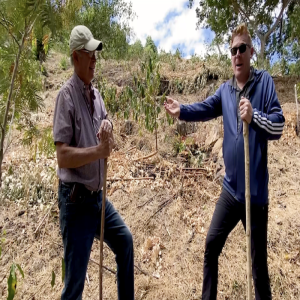
Saturday Sep 26, 2020
Episode 620: El Salvador Finca Argentina Fincona 2 Washed Bourbon
Saturday Sep 26, 2020
Saturday Sep 26, 2020

Finca Argentina is based in the Apaneca-Ilamtepec mountain range, near the town of Turin in the Ahuachapán department. The beautiful 35-hectare farm has natural hot springs dotted all over, and is situated at an altitude of 1300 metres above sea level. My very dear friend Alejandro Martinez owns the farm along with his father Mauricio, who inherited the land along with a handful of other coffee farms in the region from Guillermo Martinez, MD (Ale's grandfather) back in 2008.
The family currently have 2 farms locally, the other being Finca Manuella that our lovely friends at 3fe regularly buy from, that they run with the help of a farm manager and approximately 25-30 staff during the non-picking season. Argentina have taken a supportive approach with their labour: this team have been with the farm for 7 years now and work on maintaining and tending to the plants year-round. The number of workers goes up to 50 during the busy harvest period, including the staff members' families who also participate in the harvest cycle to help them complement their income. Furthermore, Ale and Mauricio host a yearly lunch with the crew to thank them for their hard work, and plant corn on the land for their employees and each staff member gets about 50lbs annually to help support their families. They have also been contributing labour and materials to support the necessary improvements to the access road for the community. This is a joint effort with the municipality, community leaders and a few other local farmers.
I've been working with the family since back in 2008, and in that time our relationship has gone from strictly professional to Ale being one of my closest friends. He became involved in coffee after he had just relocated to El Salvador from New York, where he'd been working as a city banker. With his son Lukas on the way and the hustle and bustle of New York, no place to bring up a family, the draw of home and El Salvador was just far too strong to ignore. While looking for work in El Salvador, Ale decided to help his father with some of his business interests and investments, including the coffee farms he had just inherited.
One of the investments pricked Ale’s interest, and this was a farm called Finca Argentina. The reason it really got Ale's attention was that he saw the farm once yielded loads of coffee but was producing a fraction of its old productivity. His father gave him permission to see what could be done to make the farm successful again. Historically, Argentina used to produce on average 1250 quintales (1 quintal = 100 pounds) with some years even producing 1500 or at the very highest harvest roughly 2000, however, the productivity levels had gone right down to 400-500 quintales by the time Ale started looking into it.
Alé began working the farm with more attention and better management in general (pruning, shading control, fertilization etc) and managed to get the harvest back to 1,100 quintales right before Roya devastated the crop the following year. In 2013 they suffered the worst harvest on record, with only 70 bags harvested due to the massive issue with leaf rust - from 1,100 qq down to 200 qq... In Ale's own words "brutal"! Since 2013 the approach has been to renovate the farm with younger trees and to diversify the varieties from the vast majority being mainly Bourbon, with the goal of the plant stock being more resilient and able to handle disease. It has been slow going since their other farm, Manuela, took precedence for replanting and so far about 60-70% of the farm has been replanted.
Since then, Finca Argentina has gone from strength to strength, but not without bumps in the road. With investment and hard work, the future is amazingly bright for Ale, his father, his family and Finca Argentina. Things are also looking up for the local fauna as the farm has, over the last five years, transitioned to a more ecological management utilizing compost and other organic products to minimize impact to the environment. Such management has led to more biodiversity: the team have seen deer at the farm as well as several species of birds, frogs, and snakes, and they noticed it has also helped improve cup quality.
Alongside these measures, they have also intercropped beans to enrich the soil in some areas of the plantation, the harvests from which serve as a bonus to the workforce alongside their corn provisions. My most recent trip to El Salvador in February of this year was an especially interesting one as it was the first time I got to visit Finca Argentina and be shown around by Mauricio instead of Alejandro. Mauricio was an amazing host during my stay at his house, and even helped to set up props to propose to my (now) fiance while we were there! Soppy Steve Alert! 😍
The farm is broken down into 7 areas or tablons, these are approximately 6 hectares in size each, but there are some smaller due to their location and other landscape characteristics:
- The highest tablon is San Jorge at 1300-1360 masl. This is 2 hectares in size and was replanted with Yellow Pacamara 4 years ago.
- Fincona 2 is the most productive tablon at a size of 8 hectares, sitting at between 1250-1300 masl.
- Fincona 1 is 4 hectares, sat at 1200-1250masl. The coffee plants here are intercropped with macadamia nut trees which are in the process of being replanted in 2020.
- Guachipelin is 6 hectares in size, and in 2016 was replanted with H1, Yellow Bourbon, Icatu and a small amount of Kenya/SL-28.
- Los Mangos, also 6 hectares, is the location of a volcanic vent with boiling mud areas!
- Piletas is 6 hectares large and is also being replanted in 2020. This is the lowest area of the farm at about 1150 to 1200masl.
- 4 Manzanas (3 hectares in size) were replanted in 2018 with Portillo (a Bourbon hybrid).

70% of plant stock in El Salvador is the Bourbon variety, this heirloom variety is one of the reasons why coffee from this country is right up amongst some of the best in the world. They have the perfect climate and conditions for this low yielding, high maintenance strain. Over the years Ale has been at the head of a vast amount of variety experimentation at Finca Argentina, trialling all sorts of less heard of plant types on sectioned-off areas of the farm. You might remember some super interesting multipacks from us in the past featuring the triumphs (and failures... all interesting to us nerds!) of this project. More recently the team have been focussed on working with those lots that have proven successful and of benefit to the farm. This year we've got a handful of winners hitting our green stores: Bourbon, Centroamericano H1, Icatu, Obata, and Kanya. All of the Washed processing is handled off the farm at a large mill nearby that is owned by Alejandro's cousin, and Naturals are processed themselves on a small scale in a greenhouse on the farm.
This is like a milk chocolate Hobnob up front, with a lovely mix of milk chocolate and biscuity sweetness. Balancing that is a gentle acidity of green apple, but it plays second fiddle to the sweetness, which shifts into hazelnut on the finish. On the aftertaste there's another hit of green apple, making for a well balanced and super easy drinking coffee.
- Country: El Salvador
- District: Ahuachapán
- Municipality: Ahuachapán
- Nearest city: Turin
- Farm: Finca Argentina
- Area of farm: Fincona 2
- Owner: Alejandro Martinez
- Altitude: 1,300 m.a.s.l.
- Varietal: Bourbon
- Processing method: Washed
CUPPING NOTES
Milk chocolate Hobnob, green apple, hazelnut
Clean cup: (1–8): 6
Sweetness: (1–8): 6.5
Acidity: (1–8): 6
Mouthfeel: (1–8): 6.5
Flavour: (1–8): 6.5
Aftertaste: (1–8): 6
Balance: (1–8): 6.5
Overall: (1–8): 6.5
Correction: (+36): +36
Total: (max. 100): 86.5
Roasting Information
Medium-dark - through first, let it slow down a little to develop body and the caramels before dropping the roast on the first pops of second.
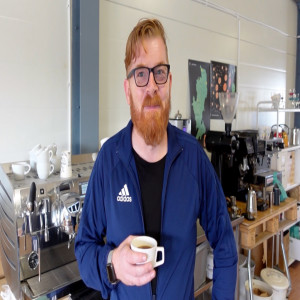
Saturday Sep 19, 2020
Episode 619: Ethiopia Ana Sora Natural
Saturday Sep 19, 2020
Saturday Sep 19, 2020
Ana Sora is a private farm owned by second-generation coffee farmer Israel Degfa. He grew up immersed in various aspects of the coffee industry as his father was a mill manager and his mum sold coffee in the local bus station to commuters. The estate is located in the Guji Zone, due East of Yirgacheffe. It’s western neighbour is Uraga and to the East is Adola - both places where Israel owns mills as well.
As coffee farms go, it's a very new farm: it was only formed in 2013. It's located at a whopping altitude of between 1,900 and 2,350 metres above sea level. It's a gorgeous but somewhat tiring walk to get there! (It's not all just holiday snaps, this coffee buying malarkey!)
We're now into our fifth wonderful year of roasting coffee from Ana Sora, and it's as exciting to see it return in 2020 as it was to roast it for the first time back in 2016! This coffee represents lots of time and energy working at the farmer's gate in Ethiopia, and it's one of the most unique coffees I've ever tasted.
My last visit to the farm was in December 2019 and I'm so pleased I was able to potter by and catch up with Israel before all this pandemic hoo-hah kicked off. Stevie Storytime 📕🙌... during my most recent trip we were driving together down a rough road that was part-way through being built when we blew out two tires at the same time. We had been travelling for 12 hours in the car and there wasn't a tyre shop anywhere nearby - so we got stuck in the middle of nowhere in the dark for three hours 😱 Thankfully one of the farm managers kindly drove out to us with a car which we took back to the house, and he slept in our car all night to keep an eye on it until the tyre shop opened. What a top bloke, he was our knight in shining armour!
It is unusual to find private farms of 250 hectares in Ethiopia (the norm being smallholder gardens of less than 2 hectares each) and even more unusual to find them at such high altitudes. Ethiopian coffee farms are high in general compared to other producing countries (mostly between 1700 - 2100 masl) but Ana Sora is on the higher side still, reaching as high as 2350 masl. The altitude helps with the slower maturation of the coffee cherry (owing in part to the generally lower temperatures and cooler nights) and allows more time for the plant to develop, which contributes to the super unique cup profile we see in coffees from Ethiopia.
Coffee growing is popular locally, and Israel also sources coffee from the surrounding area. Each washing station has around 1000-2000 members, each with one of the small home coffee plots typical of Ethiopia producing very small quantities. The area is populated by smallholder farmers who speak Oromife and are of Oromo ethnicity. Israel believes in helping these farmers through education in husbandry, and also through financial assistance.
Situated alongside the river Turo, the farm used to only produce naturally processed coffee. However, in 2018 the farmers decided to take advantage of the water source and built a washing station capable of producing washed coffee too.
Cherries are hand-sorted for unripes and overripes before they go into floatation tanks, where they're covered with water. Any cherries that float are removed. Whole, ripe cherries are then dried in the sunshine on raised African drying beds, which are laid out on hessian cloths for about 15–18 days depending on the weather conditions. The cherries are covered with plastic or shade nets during the midday heat and at night.
It's a unique coffee from a unique relationship, and I'm massively excited to share this coffee with you once again.
This is a super elegant natural processed coffee. I get a big hit of Parma Violets, rolling in to hibiscus. There’s a sweetness backing it up which reminds me of peach tea, then on that aftertaste, you get a fresh blueberry.
- Country: Ethiopia
- Area: Guji zone
- Nearest town: Yirgacheffe
- Farm: Ana Sora
- Varietal: Indigenous wild varietals
- Processing: Natural
- Owner: Israel Degfa
- Founding year: 2013
- Altitude: 1,900–2,350 m.a.s.l.
- Farm size: 250 hectares
- Coffee growing area: 150 hectares
CUPPING NOTES
Parma Violets, peach tea, hibiscus, blueberry
Clean cup: (1–8): 6.5
Sweetness: (1–8): 7
Acidity: (1–8): 6.5
Mouthfeel: (1–8): 6
Flavour: (1–8): 8
Aftertaste: (1–8): 6
Balance: (1–8): 6
Overall: (1–8): 7
Correction: (+36): +36
Total: (max. 100): 89
Roasting Information
Medium – run it nicely through first crack and get the development you need, but don't push it too far or you'll lose the fruit and floral character.

Saturday Sep 12, 2020
Episode 618: Nicaragua La Escondida Washed Red Catuai
Saturday Sep 12, 2020
Saturday Sep 12, 2020
Finca La Escondida is close to Lake Apanas near the city of Jinotega, which is the capital of the department of Jinotega in the north-central region of Nicaragua.
The straight translation from Spanish to English of 'escondida' is ‘hidden’. The farm is called 'Escondida' because it's 'hidden' from the road by forest and trees, which makes it appear to blend right into the side of the mountain.
In the grand scheme of coffee farm things, La Escondida is still a rather young farm. The first trees were planted there in 2006; just fourteen years ago. La Escondida was planned around identifying the plots with individually different micro-environments resulting from factors such as soil quality, sun exposure and temperature range. This is one of the upsides of planting a new farm: getting to plan ahead!
The varietal of this lot is Red Catuai. The owners selected it for the farm because they thought it would do well with the soil quality, sun exposure, temperature range and weather conditions, given the farm's quite exposed on the side of the mountain.
Catuai is related to Yellow Caturra and Mundo Novo, and it's a hybrid that grows best above 800 metres. It is most prevalent in Brazil and Central/South America. This is a dwarf variety of plant; it doesn't grow very high, and this is its most obvious distinguishing trait. Selected by the Instituto Agronomico in the 1950s, it now accounts for 50% of the coffee acreage in Brazil and is widely used in Central America. It also benefits from the fruit not falling off the branch easily. This helps when there are strong winds or rain, or where windbreaker coverage is at a minimum – like it is at this farm.
Expect a big, chewy body to this coffee - think toffee with bits of walnut mixed in. On the aftertaste is a little hit of dark chocolate.
- Country: Nicaragua
- Department: Jinotega
- Farm: La Escondida
- Farm manager: Boanerje Martinez Montenegro
- Coffee growing area: 92 manzanas
- Altitude: 975–1,230 m.a.s.l.
- Varietal: Red Catuai
- Processing method: Washed
CUPPING NOTES
Toffee, walnut, dark chocolate
Clean cup: (1–8): 6
Sweetness: (1–8): 6.5
Acidity: (1–8): 6
Mouthfeel: (1–8): 7
Flavour: (1–8): 6.5
Aftertaste: (1–8): 6
Balance: (1–8): 6.5
Overall: (1–8): 6.5
Correction: (+36): +36
Total: (max. 100): 87
Roast Information
Medium-dark – through first and keep it steadily progressing through the gap, looking for the first pops of second as it cools - no more.
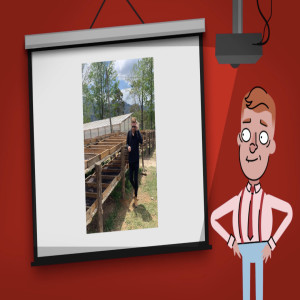
Saturday Sep 05, 2020
Episode 617: Honduras Finca Cerro Azul Washed Catuai
Saturday Sep 05, 2020
Saturday Sep 05, 2020
Cerro Azul is one of the Mierisch family’s newer coffee projects in Honduras. The name 'Mierisch' might sound familiar; they have brought us Limoncillo, Escondida, San Jose and Mama Mina, to name just a few of their amazing farms.
The Mierisch family have been growing coffee for four generations, going on five, in Nicaragua. They have achieved great results with their special way of farming, and more importantly by reaching out to specialty buyers and being at the forefront of coffee development.
This farm started life as an experiment for the Mierisch family. To farm here, they went across the border of their mother country and drove six hours from their home to neighbouring Honduras.
I've spoken with Erwin a lot about why the family made this decision, and it came down to his experiences as one of the Head Judges for the Cup of Excellence competitions in Honduras. He had seen amazing potential, but he'd also seen a lack of care and attention to detail during the processing stage. This detail is vital to truly special coffee, and Erwin and his family are some of the best-qualified processing technicians I have ever met. This opportunity was a match made in heaven.
In 2011 they started the project of revitalising Finca Cerro Azul in the region of the national park, Azul Meambar. It's in Siguatepeque, Comayagua, Honduras, and is across from Finca El Cielito, Santa Barbara. The farm lies on the other side of Lake Yojoa, and is blessed with micro-climates and conditions that are familiar to the family because those conditions are similar to the ones they experience on their lands in Nicaragua.
But the soil is something else, as is the plant stock they have inherited. We were some of the first to taste the fruits of their hard work and long drives to their new farm.
You'll get a refreshing white grape at the start of this, but it's quickly backed up by milk chocolate. On the finish I get pear, for a well balanced cup which is easy drinking.
- Country: Honduras
- Department: Comayagua
- Municipality: Siguatepeque
- Community: Rio Bonito
- Farm: Finca Cerro Azul
- Farm managers: Francisco Escobar and Lidia Zeledon
- Farm owners: The Mierisch family
- Area: 135 hectares
- Elevation: 1,450–1,900 m.a.s.l.
- Diurnal temperature cycle: average high: 26 C, average low: 16 C
- Varietal: Catuai
- Shade: Inga and Liquidambar
- Processing method: Washed
CUPPING NOTES
White grape, milk chocolate, pear
Clean cup: (1–8): 6.5
Sweetness: (1–8): 6
Acidity: (1–8): 6
Mouthfeel: (1–8): 6
Flavour: (1–8): 7
Aftertaste: (1–8): 6
Balance: (1–8): 7
Overall: (1–8): 6.5
Correction:(+36): +36
Total (max. 100): 87
Roast Information
Medium-dark – take it through first and give it a little time to develop in the gap, dropping just as it hits second.

Saturday Aug 29, 2020
Episode 616: Guatemala El Limon Natural Caturra
Saturday Aug 29, 2020
Saturday Aug 29, 2020
A desire to experiment is one of the big reasons that I love buying from Finca El Limon; we have been getting coffee from them since we were introduced by our mutual friend Raul Rodas (2012 World Barista Champion) seven years ago, and they're still impressing me!
The experimentation is thanks to the motivation of Guadalupe Alberto Reyes (known as Beto to his friends), He's been the owner of the farm for 21 years now, and in recent years he has really focussed on the farm and on continually striving to improve. He aims to take more care in every step they take on the farm, from picking, to processing, to shipping. They also take care with the agronomy of the farm; Beto's son, Saul, has been studying agronomy at the local college for the past seven years, and he uses his knowledge to benefit practices on the farm.
All the family have a part to play in the day-to-day farm running, including Beto's wife Maralyn; their children Saul, Elena, and Betio; Betio's wife Mafer; and Beto's brother Felix, who runs their mill. In addition to the family, they employ a team of seven workers outside of harvest. That team manages the weeding, mill upgrades and general farm work.
The farm itself is eighteen hectares in size and sits at an altitude between 1600–1800 metres above sea level. The farm mainly produces Caturra and Bourbon, with a smattering of Pacamara, San Ramon, and Pache alongside.
It is located roughly an hour's drive to the east of Guatemala City in the small town of Palencia, which Beto also happens to be Mayor of! He has helped to build and develop the town alongside running his farm – I honestly don't know how he finds enough hours in the day, what a guy!
Palencia is not part of the eight regions of coffee as defined by Anacafé (the National Association of Coffee in Guatemala), but you can see a lot of development in the zone, and this farm is a perfect example of that development. I like being in places that are working to be hot and up-and-coming, as well as those that are established players. Over time El Limon has become one of our favourite Hasrelationships, and back in 2013, they were the first producers that we ever bought from directly in Guatemala.
The dedication and care devoted to each step of production is reflected in the fact that the family operate their own wet mill, so that they can separate different lots and have control over the quality of the coffee. They are able to process many lots simultaneously and keep separate days' pickings, processes, and varietals in their own parcels. The wet mill also benefits the local community as neighbours within the region of Palencia also bring their coffees to the mill to be processed.
They have had the mill on-site since the very beginning but it's very much an ongoing project and they recently invested in a rebuild, alongside the construction of a QC laboratory, a new warehouse, and accommodation for their staff. Beto doesn't want to stand still and is continuing to invest in the farm. You can tell that this is a farm on top of their game. Whenever I visit, my questions are dispatched with exactly the right answer and every suggestion is listened to and taken on board.
As well as being skilled professionals, Beto and his family have always been the perfect hosts whenever I visit the farm. They are such welcoming people and take great pride in showing me around their farm. One of the kindest things they've done for me is to welcome me into their home when I am visiting, and they always prepare the most amazing meals! Every time I'm round they cook a dish called Kak'ik (basically translates to 'red and spicy' from Mayan). It's like a broth with a whole turkey leg in it, and it's BOSTIN! It is indeed very red, but it’s not terribly spicy unless you want it to be, and it's arguably the national dish of Guatemala, with versions of it having been made since long before the Spaniards showed up.
When you travel as much as I do, mid-trip you find yourself longing for something big, home-cooked, and not from a restaurant or roadside pop-up cafe. Traditional Guatemalan meals are just the ticket, and I always look forward to the food – but mainly I look forward to the company.
The natural processing brings loads of sweet fruit flavours to this cup. There's soft figs, bruised plums and sultana. There's a brandy edge to that, but it finishes sweet again with brown sugar.
- Country: Guatemala
- Region: Palencia
- Farm: El Limon
- Producer: Guadalupe Alberto 'Beto' Reyes
- Altitude: 1,600 m.a.s.l.
- Varietal: Caturra
- Processing method: Natural
CUPPING NOTES
Fig, bruised plum, sultana, brandy, brown sugar
Clean cup: (1–8): 6
Sweetness: (1–8): 6.5
Acidity: (1–8): 6
Mouthfeel: (1–8): 6.5
Flavour: (1–8): 7
Aftertaste: (1–8): 6
Balance: (1–8): 6.5
Overall: (1–8): 6.5
Correction: (+36): +36
Total: (max. 100): 87
Roasting Information
Medium-dark – through first, don't let it run away but keep the temperature going up steadily, and drop with those first pops of second in the cooling tray.

Saturday Aug 22, 2020
Episode 615: Nicaragua Finca Limoncillo Washed Red Pacamara Peaberry
Saturday Aug 22, 2020
Saturday Aug 22, 2020
The story of Hasbean and Finca Limoncillo is a long and exciting one - we've been working together for 13 years now! A bakers' dozen of coffee harvests shared between Matagalpa and Stafford make us very happy customers. I've been telling the story of this relationship for many years now and I don't intend to stop any time soon because it's such a big, big, big relationship for me 🌟 So much of where we are today has come from this relationship. I'm really proud of everything that's happened in the past, and super excited for where we can go in the future.
Limoncillo (and a handful of other fantastic farms) are owned by Dr. Erwin Mierich. Having previously lived and worked in the USA, he returned to Nicaragua in the mid-1990s. He explained, "While I was living in the United States, I worked as a gynaecologist, but then I had to come back to Nicaragua and lead this farm. Coffee has been my passion since I was a little boy". In the years we have worked together Erwin has visited Stafford many times, and it's always a pleasure to have him around. Last time he was visiting we ended up at a Weird Beard tap takeover in Manchester, talking to two Weird Beards about crazy brewing/coffee farming ideas! A coffee from Finca Limoncillo (the 'Funky Red Pacamara') is used in two of Weird Beard's beers: Black Perle and Double Perle, both of which are mighty delicious beers! A fitting collaboration to evolve from our continued business dealings when you consider how much time the family have dedicated to showing me how Latin American people like to party! On my very first visit to Nicaragua, the two people who showed me around were Erwin Jr and Steve Mierisch, the sons of the farmer. It was really cool, lifelong friends were made, and they taught me a lot about coffee production in the region.
Our relationship with Finca Limoncillo began in 2007, and back then we were buying their delicious coffee as part of a buying group. I cupped the coffee and instantly loved it - I knew I had to have it. It was a wonderful surprise to discover after the auction closed that it was owned by a family in Nicaragua who were already good friends of mine, and indeed probably the only people I knew from the whole country! The following year I visited the farm with our Nicaraguan importers and through my phenomenal Steve Pester Powers I got them to agree to bring the coffee into the UK for us (probably just to stop the flow of emails and phone calls from that annoying ginger bloke!)
A few years ago we were notified by the importers that they would not be buying the coffee again (for reasons other than the cup quality) which led to some frantic phone calls on my part, and a dig down the back of the sofa for enough loose change to fund buying 12 months' worth of coffee all in one go. There were many, many obstacles in the way of doing this deal, but we were lucky in that we were able to pull everything together in a very short amount of time. The upside of all of this is that we now work directly with Finca Limoncillo instead of going via anyone else. This coffee has gone from a one-off Cup of Excellence buy to a fantastic long-term relationship that I'm so very proud to have.
Finca Limoncillo is located in the Matagalpa region of Nicaragua and it's a whopping 171 hectares in size, which is heckin chonky! 109 hectares of this is used for coffee cultivation, with the remainder used to raise cattle and horses, and left to natural woodland. The family have heaps of policies and initiatives to make everything as sustainable as possible on this vast farming area: their use of chemicals is minimal, and the impact on the environment is always minimised by careful and considerate land management.
It's owned and run by the Mierisch family who are, by now, very close friends, and well-respected producers in Nicaragua. They're known for their experimental processing, varietal work, and exceptional coffee. The family employ over 3000 staff during the harvest, and at Limoncillo over 60 families live on the farm full time. They are seriously loved by the guys who work for them, more than any other producer we buy from there is genuine love and respect between the family and their workers. The fact that the family are our friends helps us drill down into the details of what they do for the people who work for them. This information continues to prove to me that good people grow good coffee. My last visit was February this year (right before the world went into lockdown!) and it was truly memorable - myself and Joanna (of Drop Coffee fame) sat up with Eleane until 2 am chatting and drinking rum together... the farm visit the next morning was a very quiet one! Luckily Limoncillo is a beautiful location, it boasts nine waterfalls within the farm, which is exactly the sort of place you want to be when you've had too much fun with friends the night before.
On the farm, the family:
- The employers pay their staff 30% more than what is typical minimum wage, as well as:
- Provide free housing for 60 families on their farms
- Provide free electricity and running water for their homes
- Provide free food for all workers
- Have free daycare facilities for families to use
- Provide free health care facilities on the farms
- Employee on-site teachers who educate their staff and teach other skills such as pottery and weaving. The goal is to help staff diversify their skills. The teachers are also paid twice the wages they would receive in the cities.
This year we have purchased 9 phenomenal lots from Limoncillo (that meanie Roland wouldn’t let me buy as many as I wanted to!), which makes up a total of 21 from the Mierisch family's farms combined - 19 Nicaraguan and 2 Honduran. This particular lot is a Pacamara Peaberry.
As well as being a big ol' Pacamara, this is also a lil' ol' Peaberry; a thing that's normally big is a little smaller than you might expect. It's an interesting mix of unusual sizing that I hope you'll enjoy.
Normally the seed of the coffee fruit grows into the green bean that we all know and love from two fertilised seeds inside each fruit, but sometimes things are a little different and a Peaberry is born. When only one of the two seeds is fertilised, it produces a smaller bean that looks like a shrunken version of what we'd normally know as a coffee bean, and that's because only one seed has grown instead of two.
Some say Peaberry coffees are sweeter and more delicious than their regular cousins; some people even come to us specifically looking for these coffees because they crave them so much! I'll let you be the judge.
I get a big, big hit of juicy sultanas here with a tropical edge of pineapple to it. As it cools it becomes really creamy, but with a biscuity edge too which makes me think of a slice of cheesecake. On the finish is the perfect finishing touch to that - a sliver of dark chocolate.
- Country: Nicaragua
- Municipality: Yasica Norte
- Region: Matagalpa
- Farm name: Limoncillo
- Producers: The Mierisch family
- Farm size: 171 hectares
- Coffee growing area: 109 hectares
- Altitude: 1,200 m.a.s.l.
- Varietal: Red Pacamara Peaberry
- Processing method: Washed
CUPPING NOTES
Sultana, cheesecake, dark chocolate
Clean cup: (1–8): 6.5
Sweetness: (1–8): 6.5
Acidity: (1–8): 6
Mouthfeel: (1–8): 6.5
Flavour: (1–8): 8
Aftertaste: (1–8): 6
Balance: (1–8): 6
Overall: (1–8): 7
Correction: (+36): +36
Total: (max. 100): 88.5
Roast Information
Medium-to-medium-dark – Keep the pace pretty steady, nothing too slow or too quick. When you get to crack, let it slow a little to help with development, but don't overdo it. Then you're looking for the very first pops of second on the drop, no more.
Brewing Tip
Pacamaras have a very unique size, density and structure, so don't expect them to grind like any other coffee. As this is a Pacamara Peaberry, it's also different to a normal Pacamara #tricky
I find going a little finer than I normally would and allowing more time for the grinder to get its teeth into the bigger beans often lead to delicious results. Don't push the grind quite as far as you would for a regular Pacamara, but still make sure to tweak what you're doing to help this coffee show off its natural awesomeness.

Saturday Aug 15, 2020
Episode 614: Costa Rica ARBAR La Isla Red Honey Villa Sarchi
Saturday Aug 15, 2020
Saturday Aug 15, 2020
We've been working with Carlos and his family since way back in 2013 and this is a cracking example of the sort of long-term relationship that we are proud of developing with our producing partners. If you read through our Coffee Archive (and my rather excellent book Coffeeography) you can see just how far we've come together since our initial meeting - back when I first bought from his group of farms they didn't even have an official name! All I knew was that it was grown by a nice chap called Carlos Arietta and it was really, really delicious. In the years since that initial purchase we've learned so much, so now we're able to share all the fun deets with you folks!
The name of their mill ARBAR comes from the combined family names: Carlos ARietta + Maria BARboza = ARBAR. Their children are Yessica, Karen, Esteban & Jose Ignacio. They run everything together, the micromill and 4 small farms, with 1 permanent worker and a few temporary staff during harvest season. This might sound like an awful lot of work to be shared between such a select team but Costa Rican farms tend to be on the smaller side compared to other producing countries. The four farms in the group are: La Casa, El Manatial, El Oasis, and La Isla. This year we have been fortunate enough to purchase coffee from all of the above.
Carlos has been growing coffee for about 40 years (La Casa being his oldest farm) with El Manatial and El Oasis coming next around 20 years later, followed by La Isla which is the latest project and still very early in it's production life. He only started processing his coffee himself at their mill from 2014 (while still paying someone else to pulp it for him... more on that in a mo) which meant he hadn't been able to present his coffee to a single buyer previously, this was fortuitous for us as this was how we happened to meet - via our mutual exporter in Costa Rica!
All of their farms are located in the Western Valley region near to the town of Lourdes de Naranjo. Carlos is very active in the local community and they have close relationships with their neighbours - which includes CoE winning producers like Herbazu, Vista Al Valle and Sumava. They operate mostly Organic processes, but aren’t Organic certified. They believe in the value of biodiversity on the farms and plants like fruit trees are positioned amid the coffee plants for shade and to help the soil - as well as providing food for the family. Activity from the Poas volcano at the start of 2019 has impacted a good deal of the Western Valley region, really quite badly in some areas, however ARBAR have been incredibly lucky to not be affected by this and have produced a good crop
This coffee hails from Finca La Isla, which is located at 1400 metres above sea level. The farm is roughly 1.4 hectares in size and is planted with a mixture of Villa Sarchi, Kenya, Geisha, and Ethiopia. Overall this area produces about 3500kg of coffee cherries, which translates to around 700kg of green coffee once processed or ~570kg of roasted coffee once your friendly neighbourhood Roasterman gets their mitts on it! This is their latest project and actually belongs to Maria’s niece. Carlos and Maria have agreed an arrangement with her where they will plant and farm the plot and share the profits with her, but it's only just starting to see production in the last couple of years.
Both myself and Roland (Head Roaster / Production Manager / Daft Fact Provider) have been lucky enough to visit Carlos and his family multiple times over the years that we've been working together and they are always guaranteed to be wonderful hosts. I'm not entirely sure I should even be paying Roland to travel to Costa Rica and go hang out with them... does it still count as work when he enjoys it so much? Our last visit was in 2019 and I tried to teach Carlos about Sunderland and how to shout “Ha’way the lads” (https://www.safc.com/news/club-news/2018/october/haway-the-lads) and promised to take him to a game if he ever visits the UK - according to Roland this might put Carlos off ever visiting the UK but I disagree!
This coffee has been processed at the ARBAR micromill using the Red Honey process. Honey processing is somewhat similar to a Pulped Natural (but uses less water), falling somewhere in between a Washed and a Natural coffee both in terms of contact between the cherry mucilage and the bean during drying time and in the resulting flavour profile. The outer skin and fruit pulp is removed from the seed (bean) of the coffee inside, and it's left to dry. The colour in the name refers to the amount of sticky fruit that's left on the surface of the seed after depulping - darker indicates more / lighter indicates less. This method can present some risk of over fermentation during processing but water is a precious commodity in this area of Costa Rica, so this method suits the location very well. Carlos definitely has the skills to pay the bills though so no worries about mucking up the Honeys at ARBAR!
Processing technique and equipment is one way that our long term relationship has benefitted us as buyers as well as Carlos and his family. Back when we first met, Carlos was taking his cherry to a local Co-op to use their depulper and then back to the house to process - this was obviously a lot of extra effort and meant that he couldn't have as much control over the details as he would have liked. That's where we joined the fun! In 2014 after chats with the family I stumped up the funds for their very own depulper - which was paid back by you lovely lot through a special price per bag on that year's coffee from ARBAR. (http://www.hasblog.co.uk/carlos-gets-a-new-depulper-thanks-to-you) Since then the mill has constantly been updated with additions and changes as they learn how to pulp better every season. The techniques and the skills they are developing are improving their coffee year on year, and it was already a dream when I first encountered it on that fateful cupping table in 2013, so that's really saying something.
There's a delicate orange at the start, but it moves quickly into a sweetness of digestive biscuit and caramel. On the finish it's cocoa powder, for a clean & well balanced easy drinker..
- Country: Costa Rica
- Region: Western Valley
- Town: Lourdes de Naranjo
- Farm: La Isla
- Farmer: Carlos Arrieta
- Micro mill: ARBAR
- Altitude: 1,400 m.a.s.l.
- Varietals: Villa Sarchi
- Processing system: Red Honey
CUPPING NOTES
Orange, digestive biscuit, cocoa powder.
Clean cup: (1–8): 6
Sweetness: (1–8): 6
Acidity: (1–8): 6.5
Mouthfeel: (1–8): 6
Flavour: (1–8): 6.5
Aftertaste: (1–8): 6
Balance: (1–8): 6.5
Overall: (1–8): 6.5
Correction: (+36): +36
Total: (max. 100): 86
Roasting Information
Medium - give it some time to develop, dropping it at the end of the gap, just before 2nd gets going.

Saturday Aug 08, 2020
Episode 613: Guatemala El Limon Washed Caturra
Saturday Aug 08, 2020
Saturday Aug 08, 2020
A desire to experiment is one of the big reasons that I love buying from Finca El Limon; we have been getting coffee from them since we were introduced by our mutual friend Raul Rodas (2012 World Barista Champion) seven years ago, and they're still impressing me!
The experimentation is thanks to the motivation of Guadalupe Alberto Reyes (known as Beto to his friends), He's been the owner of the farm for 21 years now, and in recent years he has really focussed on the farm and on continually striving to improve. He aims to take more care in every step they take on the farm, from picking, to processing, to shipping. They also take care with the agronomy of the farm; Beto's son, Saul, has been studying agronomy at the local college for the past seven years, and he uses his knowledge to benefit practices on the farm.
All the family have a part to play in the day-to-day farm running, including Beto's wife Maralyn; their children Saul, Elena, and Betio; Betio's wife Mafer; and Beto's brother Felix, who runs their mill. In addition to the family, they employ a team of seven workers outside of harvest. That team manages the weeding, mill upgrades and general farm work.
The farm itself is eighteen hectares in size and sits at an altitude between 1600–1800 metres above sea level. The farm mainly produces Caturra and Bourbon, with a smattering of Pacamara, San Ramon, and Pache alongside.
It is located roughly an hour's drive to the east of Guatemala City in the small town of Palencia, which Beto also happens to be Mayor of! He has helped to build and develop the town alongside running his farm – I honestly don't know how he finds enough hours in the day, what a guy!
Palencia is not part of the eight regions of coffee as defined by Anacafé (the National Association of Coffee in Guatemala), but you can see a lot of development in the zone, and this farm is a perfect example of that development. I like being in places that are working to be hot and up-and-coming, as well as those that are established players. Over time El Limon has become one of our favourite Hasrelationships, and back in 2013, they were the first producers that we ever bought from directly in Guatemala.
The dedication and care devoted to each step of production is reflected in the fact that the family operate their own wet mill, so that they can separate different lots and have control over the quality of the coffee. They are able to process many lots simultaneously and keep separate days' pickings, processes, and varietals in their own parcels. The wet mill also benefits the local community as neighbours within the region of Palencia also bring their coffees to the mill to be processed.
They have had the mill on-site since the very beginning but it's very much an ongoing project and they recently invested in a rebuild, alongside the construction of a QC laboratory, a new warehouse, and accommodation for their staff. Beto doesn't want to stand still and is continuing to invest in the farm. You can tell that this is a farm on top of their game. Whenever I visit, my questions are dispatched with exactly the right answer and every suggestion is listened to and taken on board.
As well as being skilled professionals, Beto and his family have always been the perfect hosts whenever I visit the farm. They are such welcoming people and take great pride in showing me around their farm. One of the kindest things they've done for me is to welcome me into their home when I am visiting, and they always prepare the most amazing meals! Every time I'm round they cook a dish called Kak'ik (basically translates to 'red and spicy' from Mayan). It's like a broth with a whole turkey leg in it, and it's BOSTIN! It is indeed very red, but it’s not terribly spicy unless you want it to be, and it's arguably the national dish of Guatemala, with versions of it having been made since long before the Spaniards showed up.
When you travel as much as I do, mid-trip you find yourself longing for something big, home-cooked, and not from a restaurant or roadside pop-up cafe. Traditional Guatemalan meals are just the ticket, and I always look forward to the food – but mainly I look forward to the company.
This is a classic easy drinker – it's all sweet malted milk biscuit covered in milk chocolate (some may say a moo cow biscuit!). As it cools, that milk chocolate becomes chocolate orange, with just a little red apple appearing on the aftertaste.
- Country: Guatemala
- Region: Palencia
- Farm: El Limon
- Farmer: Guadalupe Alberto 'Beto' Reyes
- Altitude: 1,600 m.a.s.l.
- Varietal: Caturra
- Processing method: Washed
CUPPING NOTES
Malted milk biscuit, milk chocolate, orange, red apple
Clean cup: (1–8): 6
Sweetness: (1–8): 6.5
Acidity: (1–8): 6
Mouthfeel: (1–8): 6
Flavour: (1–8): 6.5
Aftertaste: (1–8): 6
Balance: (1–8): 6.5
Overall: (1–8): 6.5
Correction: (+36): +36
Total: (max. 100): 86
Roast Information
Medium-dark – keep this pretty balanced in its profile. Go through first, push it through the gap until you get to the cusp of second, and drop.
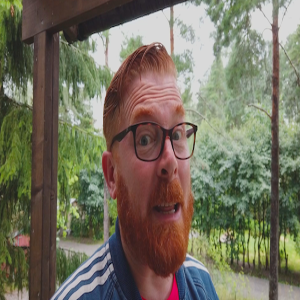
Saturday Aug 01, 2020
Episode 612: Tanzania Burka Estate Natural
Saturday Aug 01, 2020
Saturday Aug 01, 2020
The Burka Coffee Estate is located on the outskirts of Arusha National Park, on the leeward side of Mount Meru and was founded in 1899 by German settlers just outside the town of Arusha in northern Tanzania. It's 80 kilometres west of Mount Kilimanjaro, Africa’s highest peak. Situated close to the Kenyan border, this north-westerly region of Tanzania is famous for the coffee it produces.
The neighbouring Selian Estate was established in 1910, and it was acquired by Burka in 1991. The first coffee trees were planted in 1918, and they now number some 1.3 million trees. They're mostly shade-grown varietals. Three hundred and fourteen acres are reserved for forests. A further 250 acres are reserved as natural grasslands.
There are around 200 permanent staff at Burka, a further 200 casual daily staff, and up to 5,000 temporary staff involved in picking and sorting at the height of harvest season. All permanent staff are provided with housing on the estates, and their salary is set at least 20% above minimum government requirements.
Staff have social security and labour union membership included in their contracts, and an estate credit union also offer loans and advice for education, health, and house construction. Each estate has its own nursery, each of which educates over 100 children, and two primary schools also cater for over 600 children from the estate workers' families and neighbouring communities. An on-site health centre with estate nurse and dispensary is available for all staff, and the estate has its own ambulance. It also has shops, sports facilities, churches, and a mosque.
Regular inter-estate and inter-camp football and netball matches occur, along with staff BBQs and other holiday celebrations. Workers are supplied with free firewood from stumped coffee trees, and fruit and nut trees are grown around the staff villages.
The staff at Burka have a combined wealth of agronomic experience, and over the course of many decades the estates have built a reputation for consistent production of fine Arabica coffees characterised by mild acidity with flavours of lemon, chocolate, and caramel.
Harvesting is carried out between the months of May and October. It's done by selective hand-picking of red ripe cherries, which is followed by further hand-sorting to remove any over- or under-ripe cherries. Cherries are then dried slowly on raised African beds for 12–14 days. The cherries are carefully maintained through consistent turning to ensure even drying and to avoid over-fermentation. They are covered at night to protect them from excess rain and moisture. Once the cherries have dried to the optimum moisture content, they are sent to Moshi for hulling, grading by bean size, and careful handpicking. They're then bagged in GrainPro for export from the port in the capital city, Dar Es Salaam.
This is a big, sticky coffee which reminds me of dark toffee. It's a little bit of a dried fruit edge, like raisins soaked in brandy, but it's that gloopy dark toffee which sticks for me.
- Country: Tanzania
- Region: Arusha
- District: Arumeru
- Estate: Burka
- Estate size: 343 hectares
- Varietals: Kent, N39, Blue Mountain and Catimor
- Processing method: Natural
- Drying method: Raised African beds
- Drying time: 12–14 days
- Altitude: 1,350 m.a.s.l.
- Soil: Young alluvial, sandy to clay loam
- Average annual rainfall: 750 mm
CUPPING NOTES
Dark toffee, raisin, brandy
Clean cup: (1–8): 6
Sweetness: (1–8): 6.5
Acidity: (1–8): 6
Mouthfeel: (1–8): 7
Flavour: (1–8): 6.5
Aftertaste: (1–8): 6
Balance: (1–8): 6
Overall: (1–8): 6.5
Correction: (+36): +36
Total: (max. 100): 86.5
Roast Information
Dark - this coffee goes quite hot and lacks clarity if underdeveloped, so mark sure it's pushed right through the gap and up to second crack before it's dropped.
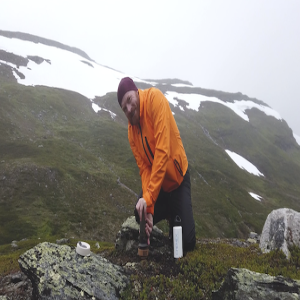
Saturday Jul 25, 2020
Episode 611: Ethiopia Ayehu Natural
Saturday Jul 25, 2020
Saturday Jul 25, 2020
We've seen some excitingly varied coffees from Ethiopia, but as varied as they are they've often come from a pretty small region - Yirgacheffe and Sidamo in the south. The coffees produced there are fantastic and one of the three major growing areas (along with Harrar in the East and Ghimbi in the West), but we were really excited to try this coffee, grown in the Amhara region in northern Ethiopia.
It's not actually the first time we've had a coffee from this region - for those of you with a long memory, we had the Lake Tana Natural way back in 2009! However, we haven't seen anything really from the region since, so we're excited to share this one with you.
Ayehu Farm is a 500-hectare single estate situated at 1,750masl. It's located in the Western Gojjam area, whose northern border is Lake Tana (map)
It's also an unusual varietal for Ethiopia - K7. This is a varietal we normally see planted on farms in Tanzania or Kenya (Kiriga Estate has a little bit of K7). It was originally released in Kenya in 1936 after being picked out from the famous French Mission selective program at Scott Labs. Find out more information about K7 at WorldCoffeeResearch.org here.
This coffee was dried slowly in the sun on raised African beds for 18 days, turned periodically to ensure even drying and prevent over-fermentation.
In the cup I get a really sweet green mango, with an edge of dark chocolate to it. As it cools a little, you get lemon rind joining it on the finish, along with a treacle flavour that carries on to the aftertaste.
- Country: Ethiopia
- Region: Amhara, Western Gojam
- Farm: Ayehu
- Farm size: 500-hectares
- Varietal: K1
- Drying method: Raised African beds
- Drying time: 18-days
- Processing method: Natural
- Altitude: 1,750 m.a.s.l.
- Soil: Sandy loam to clay loam
CUPPING NOTES
Green mango, dark chocolate, lemon rind, treacle
Clean cup: (1–8): 6
Sweetness: (1–8): 6.5
Acidity: (1–8): 6.5
Mouthfeel: (1–8): 6
Flavour: (1–8): 7
Aftertaste: (1–8): 6.5
Balance: (1–8): 6
Overall: (1–8): 6.5
Correction:(+36): +36
Total (max. 100): 87
Roast Information
Medium-dark - this roasts more like a Tanzanian or Burundi Natural than an Ethiopian, so you may need to take it quite hot to get it to the edge of second gap where the flavours will really sing.
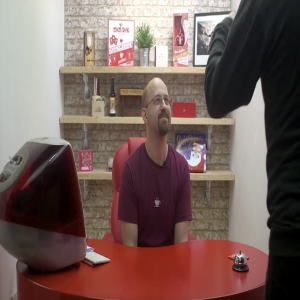
Saturday Jul 18, 2020
Episode 610: Costa Rica Don Joel Finca Carmela Red Honey Villa Sarchi
Saturday Jul 18, 2020
Saturday Jul 18, 2020
This is our fifth year buying from the folks at Finca Carmela. The 3-hectare farm is owned by Allan Oviedo Rodriguez and his family, along with the neighbouring Finca La Cumbre, and the Don Joel micromill which services the processing needs of both farms (along with occasional small lots for their neighbours when there's space as they've got a good reputation for it).
Finca Carmela is located right on the border between the Central and Western Valleys, in the Alajuela province of Costa Rica. Situated around 1600 metres above sea level, the farm is just a short 5 minute drive away from their first farm La Cumbre on the other side of the hill.
Allan has been producing coffee in the area for 18 years; he grew up in a coffee family and learnt the traditional producing methods alongside his father (Don Joel) and brothers. It was during these early years that he saw the difficulties that came with making a living as a coffee farmer, such as poor returns for what is a very demanding job, and the ever-increasing cost of living.
When Allan inherited his first farm La Cumbre (the larger family farm was divided between him and his brothers when Don Joel passed away) he decided to implement changes to improve their lot. During his early years of owning the farm he used to work as a taxi driver in San Jose by night and managing the farm by day to make ends meet. But owning the farm was his dream and he was ardently focused on giving that security to his family.
With a mix of willingness to try new things, an eye for detail, and the ability to learn quickly, Allan was able to keep improving his farm. A regular visitor to the wet mill where his coffee was being processed, he took a keen interest in how the processes worked and how the best results could be achieved, which lead him to build his own micromill on La Cumbre, naming it after his father. He began to work on replanting the land with a focus on high-quality cup profile. The varietals he chose to work with were Caturra, Catuai, and Villa Sarchi.
Finca Carmela followed when Allan was able to invest in expanding his growing area, and here planted mainly Villa Sarchi and Typica, which he's now been tending for 4 years. Allan employs 2 staff outside harvest season, and staffing during the harvest will depend how good the year is - 7 people in a bad year, up to a maximum of 20 in a really good year.
Despite the very short distance between the two farms, they exhibit interestingly different microclimates that impact the way that the coffee thrives. For example, rain may reach one side of the mountain but not the other, strong winds can damage one whilst the other is sheltered. These factors may seem small, but can make a big difference in terms of when the coffee plant goes into flower, how much sun it gets, whether plants get damaged etc and this all adds up.
You can see Poás Volcano from La Cumbre, which makes the farm roughly North-East facing, whereas Carmela is more South-East as you can see back towards San Jose. Think about it like planting up your garden at home - south facing? lots of shade? good drainage? Shelter from wind? all of these things are going to have an effect on what sort of plants are happiest living there, and happy plants are the first step towards tasty coffee!
Like a lot of Costa Rican producers, Allan’s scale is very small. However, he’s got an interest in the wider world and wider coffee market which we’ve only usually seen in producers who are much larger and well-travelled. On his most recent visit, Roland spent the day with him and over a delicious dinner (cooked by his wife) they quizzed him on global coffee trends, new processes and origins, what customers liked and didn’t, British politics, roasting… it was wide-ranging! Roland says "I was there with Davian, who works with our exporters. His English is a bit better than my Spanish, but not by a long way, so I can say it was quite a challenge to explain Brexit! (Thank you Google Translate)."
Of the people we work with, Allan is situated the closest to Poás Volcano - only 7km away. He had worked incredibly hard building up the farm, taking on Carmela and expanding La Cumbre - then it spewed ash over the area in 2019. It really brings home the risks a producer takes when they invest in their farm. In one swoop, all his plants had leaves hidden by ash and all he could do was hope the rains would come quickly to wash it away. This was further impacted by the 2019 El Niño, where warming reinforced the dry season patterns January through April and reduced rainfall during the rainy season in June through December. All this added up to a very difficult period for production in Costa Rica, but we're pleased to hear that things are much more positive this year and Allan has managed to get a great crop from Carmela.
It's milk chocolate and lime all the way here. Super sweet and clean, on the finish there's an unusual delicate hint of mint which I love, before the aftertaste brings sweet caramel and chocolate again.
- Country: Costa Rica
- Region: Western Valley
- Province: Alajuela
- Nearest City: San Luis de Grecia
- Farm: Finca Carmela
- Micromill: Don Joel
- Producer: Allan Oviedo Rodriguez and family
- Altitude: 1,600 m.a.s.l.
- Processing method: Red Honey
- Varietal: Villa Sarchi
CUPPING NOTES
Milk chocolate, lime, mint, caramel
Clean cup: (1–8): 6.5
Sweetness: (1–8): 7
Acidity: (1–8): 6.5
Mouthfeel: (1–8): 6
Flavour: (1–8): 6.5
Aftertaste: (1–8): 6
Balance: (1–8): 6.5
Overall: (1–8): 6.5
Correction:(+36): +36
Total (max. 100): 87.5
Roast Information:
Medium - into the gap at a nice steady pace, but drop it before second gets going.
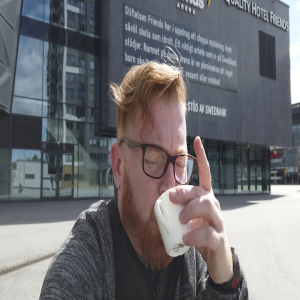
Saturday Jul 11, 2020
Episode 609: Guatemala El Limon Washed San Ramon
Saturday Jul 11, 2020
Saturday Jul 11, 2020
A desire to experiment is one of the big reasons that I love buying from Finca El Limon; we have been getting coffee from them since we were introduced by our mutual friend Raul Rodas (2012 World Barista Champion) 7 years ago, and they're still impressing me! The experimentation is thanks to the motivation of Guadalupe Alberto Reyes (known as Beto to his friends), he's been the owner of the farm for 21 years now and in recent years he has really focussed on the farm and on continually striving to improve. He aims to take more care in every step they take - from picking, to processing, to shipping. Also in the agronomy of the farm, as Beto's son Saul has been studying agronomy at the local college for the past 7 years and using his knowledge to benefit practices on the farm. All the family have a part to play in the day-to-day running, including Beto's wife Maralyn, their children Saul, Elena, and Betio plus his wife Mafer, and Beto's brother Felix who runs their mill. In addition to the family, they employ a team of 7 outside of harvest that manages the weeding, mill upgrades and general farm work.
The farm itself is 18 hectares in size and sits at an altitude between 1600 - 1800 metres above sea level. The farm mainly produces Caturra and Bourbon, with a smattering of Pacamara, San Ramon, and Pache alongside. It is located roughly an hour's drive to the east of Guatemala City in the small town of Palencia, which Beto also happens to be Mayor of! He has helped to build and develop the town alongside running his farm - I honestly don't know how he finds enough hours in the day, what a guy! Palencia is not part of the eight regions of coffee as defined by Anacafé (the National Association of Coffee in Guatemala), but you can see a lot of development in the zone, and this farm is a perfect example of that development. I like being in places that are working to be hot and up-and-coming, as well as those that are established players. Over time El Limon has become one of our favourite Hasrelationships, and back in 2013, they were the first producers that we ever bought from directly in Guatemala.
The dedication and care devoted to each step of production is reflected in the fact that the family operate their own wet mill, so that they can separate different lots and have control over the quality of the coffee. They are able to process many lots simultaneously and keep separate days' pickings, processes, and varietals in their own parcels. The wet mill also benefits the local community as neighbours within the region of Palencia also bring their coffees to the mill to be processed. They have had the mill on-site since the very beginning but it's very much an ongoing project and they recently invested in a rebuild, alongside the construction of a QC laboratory, a new warehouse, and accommodation for their staff. Beto doesn't want to stand still and is continuing to invest in the farm. You can tell that this is a farm on top of their game. Whenever I visit my questions are dispatched with exactly the right answer and every suggestion is listened to and taken on board.
As well as being skilled professionals, Beto and his family have always been the perfect hosts whenever I visit the farm. They are such welcoming people and take great pride in showing me around their farm. One of the kindest things they've done for me is to welcome me into their home when I am visiting, and they always prepare the most amazing meals! Every time I'm round they cook a dish called Kak'ik (basically translates to "red and spicy" from Mayan) - it's like a broth with a whole turkey leg in and it's BOSTIN! It is indeed very red, but it’s not terribly spicy, unless you want it to be, and it's arguably the national dish of Guatemala, with versions of it having been made since long before the Spaniards showed up. When you travel as much as I do, mid-trip you find yourself longing for something big, home-cooked, and not from a restaurant or roadside pop-up cafe. Traditional Guatemalan meals are just the ticket, and I always look forward to the food – but mainly I look forward to the company.
A wonderfully easy-drinking coffee, this reminds me of a chocolate-coated digestive biscuit, with hints of white sugar and caramel in the background. There's just a hint of white grape acidity, balancing out that full, biscuity sweetness.
- Country: Guatemala
- Region: Palencia
- Farm: El Limon
- Farmer: Guadalupe Alberto 'Beto' Reyes
- Altitude: 1,600 m.a.s.l.
- Varietal: San Ramon
- Processing method: Washed
CUPPING NOTES
Milk chocolate, Digestive Biscuit, white grape
Clean cup: (1–8): 6
Sweetness: (1–8): 7
Acidity: (1–8): 6
Mouthfeel: (1–8): 6
Flavour: (1–8): 6.5
Aftertaste: (1–8): 6
Balance: (1–8): 6.5
Overall: (1–8): 6.5
Correction: (+36): +36
Total: (max. 100): 86.5
Roasting Information
Medium-dark - push it through the gap and look for those first pops of second on the drop. It'll take a little extra time in development to build the sweetness, but don't overdo it or you'll lose the nice balance of the cup.
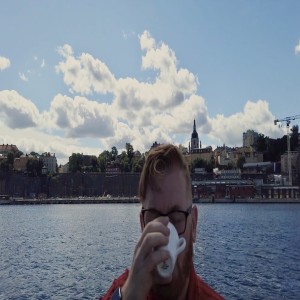
Saturday Jul 04, 2020
Episode 608: Costa Rica Finca Licho Yellow Honey Villa Sarchi
Saturday Jul 04, 2020
Saturday Jul 04, 2020
Here at Hasbean we love to celebrate the awesome things that happen when strong relationships are built between roasters and producers, and Finca Licho is a shining example of that ethos.
We first bought from this farm way back in 2007 when it was awarded 4th place in the Cup of Excellence. Fast forward 13 years (gosh I feel old now) and Licho has become a firm favourite with both customers and our little Hasbean team - the arrival of coffees from Finca Licho is greatly anticipated every year. I really feel that this coffee showcases our development as a roaster over the years as we've moved from buying via an importer to buying directly from the farm ourselves.
5 years ago I visited the farm and made a deal with the brothers for a European exclusive on these coffees, and this year we continue that. You'll not see these coffees anywhere else in Europe - they're so tasty we wanted them all for ourselves! I love the fact that I simply walked onto the farm after cupping a particular lot in the exporter's office, had a chat about how much money they wanted, and then we shook hands. We got back into the 4x4 and drove away with a very happy Steve!
The farm is owned and run by Los Hermanos Aguilera - often translated as "The Aguilera Bros", but everyone is involved, not just the boys! The family of 12 brothers and sisters inherited the business from their parents who started their coffee growing career over 50 years ago. With the help of the third generation, the family work the farm with basically no hired labour except for during the harvest. They manage the mill and drying patios, fertilise, prune the coffee trees etc, all themselves, all year round. The Aguileras have a reputation for their deep understanding of quality at the farm and mill level, and this is why we are excited about working with them.
Situated 1500 metres above sea level in the region of Naranjo, the farm is located in the volcanic Northern Cordiles corridor of the Western Valley, which is an area famous for it's excellent coffee production. The majority of the coffee grown at Finca Licho is the Villa Sarchi variety with a smidge of Caturra too (about 65% and 25% of production respectively) and the remainder is made up of a mixture of more unusual varieties, some of which we've been able to snag this year now that they're established enough to provide a crop.
This coffee is honey processed, which is similar to the pulped natural method. The outer skin and fruit pulp is removed from the seed (bean) of the coffee inside, and it's left to dry. The main difference between this and a pulped natural is that there is less water used when the cherry is removed, so mucilage sticks to the surface of the bean. There are a spectrum of varying honey processes depending on how much of the fruity material is left intact - these range from white honey (least mucilage / closest to a washed coffee) to black honey (most mucilage / closest to a natural coffee). Lighter honeying methods tend to be used on coffee from higher altitudes, and darker honeying for lower altitudes. This is based on the producers' understanding of which crops will benefit most from the different attributes that honey processing brings to the cup, as the sugar content of the fruit alters fermentation and increases the perception of sweetness in the final coffee.
This method can present some risks during processing but water is a precious commodity in this area of Naranjo, so this method suits the location very well. The beans end up clinging together whilst drying because of their sticky layer of mucilage (hence the name "honey" processing) so the coffee needs to be turned regularly to break apart these clusters of beans. Over-fermentation can happen at this stage and you can end up with undesirable flavours developing, but the Aguileras are well-versed in this method and are some of the most skilled in Costa Rica!
Want to know a little more about honey processing? Here's a video you might enjoy!
This starts with fresh raspberry and a sweetness of white sugar. On the aftertaste that sweetness is joined by almond, making me think of frangipane - it's a Bakewell Tart in coffee form!
- Country: Costa Rica
- Region: Western Valley
- Province: Alajuela
- Nearest city: Naranjo de Alajuela
- Farm: Finca Licho
- Producers: Aguilera family
- Farm size: 28.00 hectares
- Coffee growing area: 9.10 hectares
- Altitude: 1,500 m.a.s.l.
- Varietal: Villa Sarchí
- Processing system: Yellow Honey
CUPPING NOTES
Raspberry, frangipane, white sugar.
Clean cup: (1–8): 6
Sweetness: (1–8): 7
Acidity: (1–8): 6.5
Mouthfeel: (1–8): 6
Flavour: (1–8): 7
Aftertaste: (1–8): 6.5
Balance: (1–8): 6
Overall: (1–8): 6.5
Correction:(+36): +36
Total: (max. 100): 87.5
Roast Information
Medium – through first crack, slow it a little to let the sweetness develop fully, but drop it before second crack gets going.
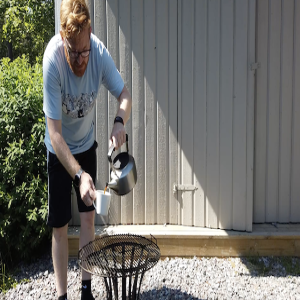
Saturday Jun 27, 2020
Episode 607: Ethiopia Banko Gutiti Washed
Saturday Jun 27, 2020
Saturday Jun 27, 2020
Ethiopia is widely considered to be the birthplace of coffee, and it's the only indigenous place in which coffee grows. Some of the plant stock can only be found in Ethiopia and has the ability to offer some of the most amazing and diverse cup profiles. With this diversity comes all manner of coffees from different ends of the spectrum (I have tasted many very ordinary lots that I would never stock) and it's why Africa remains a tough place for us to find consistent and amazing coffee – but I have also tasted some of the most special coffees ever from this region, and Africa has the ability to show the non-believers that coffee can taste of other things.
Located in the the Kochere Region, near Yirgacheffe, is the Banko Gutiti Mill, where the combination of high altitude, fertile soil, consistent and plentiful rains, and an abundance of local knowledge all come together to produce, arguably, some of the most in-demand coffee in the world. Owned by Alemu Bukato, and in the ‘Southern Nations, Nationalities & Peoples’ (SNNP) region of Ethiopia, there are almost 650 smallholders who contribute to the coffee produced at this mill! These smallholders typically have a very small (hence the name!) patch of land, on which they grow their coffee, and they are able to bring their ripe coffee cherries to this wetmill for sorting, processing and selling.
Once the cherries are delivered to the wetmill, they are carefully sorted and pulped, before being fermented for 36-48 hours, depending on the climate and humidity conditions. Once the cherries have been fermented, the coffee is thoroughly washed and graded by bean density before being dried in the sun on raised African beds for 12 - 15 days. During this drying period, there's a lot that goes in to making sure the coffee is dried evenly: In the daytime the coffee is raked and turned periodically to ensure a consistent drying process. The coffee is also covered between 12pm and 3pm to protect it from the hot sun, and at night time to protect it from rainfall and moisture. This requires a lot of careful attention and we think it really shows in the cup!
Up front this is lemon cordial, refreshing but also sweet and juicy. There’s a hint of black tea on the finish and a delicate floral edge running through it all, but the citrus is the there again on the aftertaste as orange zest and reminds us this one is all about the fruit.
- Country: Ethiopia
- Region: Gutiti Kebele
- District: Kochere
- Mill location: Banko Gutiti
- Mill Manager: Alemu Bukato
- Varietal: Indigenous wild
- Processing: Washed
- Altitude: 1,900-2,100 m.a.s.l.
- Rainfall: 1800–2000 mm
- Soil: Fertile, red-brown, well drained
CUPPING NOTES
Lemon cordial, black tea, orange zest, floral.
Clean cup: (1–8): 7
Sweetness: (1–8): 6.5
Acidity: (1–8): 7
Mouthfeel: (1–8): 6.5
Flavour: (1–8): 6.5
Aftertaste: (1–8): 6
Balance: (1–8): 6
Overall: (1–8): 7.5
Correction: (+36): +36
Total (max. 100): 88
Roast Information
Medium – Don't go too slow - you want to highlight the lovely zing of the lemon. Push it through first crack and drop it once you're in the gap.

Saturday Jun 20, 2020
Episode 606: Brazil Carmo Estate Pulped Natural Bourbon
Saturday Jun 20, 2020
Saturday Jun 20, 2020
The Junqueira family started growing coffee on the highlands of southern Minas Gerais 150 years ago. The current owner is Tulio Junquiera. He's from the fifth generation of the family, and he's combined tradition with innovation to make Carmo Estate a sustainable farm dedicated to the production of specialty coffees. Tulio is also a former president of the Brazil Specialty Coffee Association (BSCA).
Carmo Estate’s mission is to produce exceptional coffees while providing its employees with a good quality of life and respecting the environment. The farm is located near the town of Heliodora in the southern state of Minas Gerais, which is a stunning region with mountainous terrain, mineral water springs, and ideal conditions to grow specialty coffees.
Carmo Estate has 220 hectares (545 acres) of land dedicated to the coffee varieties Mundo Novo, Catuaí, Catucaí, Bourbon, Acaiá and Icatú. The owners’ personal attention, the agronomists’ specialist supervision, and the fertile soil contribute to an average yield of 40 bags per hectare. That's more than twice the national average. Coffees from Carmo Estate are grown at altitudes ranging from 950 to 1,200 metres above sea level (3,100 to 3,900 feet).
The milling facilities at Carmo Estate were developed especially for the production of high-quality specialty Naturals and Pulped Naturals. The spacious drying patios are complemented by mechanical dryers, which are used when weather conditions are not favourable. The farm stores all of its coffee in wooden silos and has its own warehouse.
Carmo Estate is committed to the wellbeing of its employees and partners. Healthcare, on-site schooling for children, programmes to encourage workers to build their own housing, adult education projects, and the importance of environmental preservation are all hallmarks of the farm. Carmo Estate also runs an innovative profit-sharing programme, in which employees are invited to become partners in Carmo Estate and thus become entitled to a share of the profits earned from the sale of its coffee.
Each year this coffee brings us lovely, sweet caramel, and this year is no exception. Alongside that, you get a hit of digestive biscuit before it finishes on pecan nuts. There's just a nod to dark chocolate too, adding depth to it all.
- Country: Brazil
- Region: Minas Gerais
- City: Heliodora
- Farm: Carmo Estate
- Altitude: 950–1,200 m.a.s.l.
- Varietal: Bourbon
- Processing: Pulped Natural
- Producer: Túlio Henrique Rennó Junqueira
CUPPING NOTES
Caramel, digestive biscuit, pecan, dark chocolate
Clean cup: (1–8): 6
Sweetness: (1–8): 7
Acidity: (1–8): 6
Mouthfeel: (1–8): 6
Flavour: (1–8): 7
Aftertaste: (1–8): 6
Balance: (1–8): 6.5
Overall: (1–8): 6.5
Correction: (+36): +36
Total (max. 100): 87
Roast Information
Medium-dark - keep the pace up pushing it through first crack, then let it slow itself down in the gap to develop those fantastic caramels, and drop it just before second gets going.
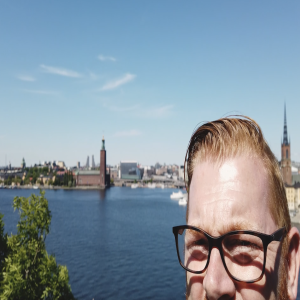
Saturday Jun 13, 2020
Episode 605: Brazil Fazenda Inglaterra Natural Bourbon
Saturday Jun 13, 2020
Saturday Jun 13, 2020
Fazenda Inglaterra is a farm we've been buying from for over ten years, and it's one that I am very proud to be working with and linked with. The owner is my very good friend, Stephen Hurst.
To tell the story of Inglaterra, I'll hand this over to Stephen of the Hurst variety to tell you how he came to own 'Inglaterra':
“Maybe it had always been an idea in the back of my mind – so a couple of years ago when some friends in Brazil mentioned that a small coffee farm was for sale, I had a look.
The farm's name (Fazenda Toca Da Onca) means 'hiding place of a small wildcat'. The locals now call the farm 'Inglaterra'. The previous owners had abandoned Toca Da Onca/Inglaterra. So we had to start again, almost from scratch. Some surviving coffee trees were pruned right back and the coffee that you are now drinking is that re-growth from the original old trees.
The farm is located near the lovely spa town of Poços de Caldas in the coffee-growing heartlands of Brazil’s Minas Gerais state. The farm's elevation is 950–1300 metres, and it has rich soil. It's on the edge of an ancient caldera/super volcano, whose outline can be seen on satellite images. 50% of the farm is virgin Mata Atlantica forest and as long as I own it, it will stay that way. I am replanting some areas with the help of my local friends Gabriel and Cristiano, without whose assistance this project would never have started."
This is a naturally processed Bourbon lot. To find out more about what this means, please make sure to have a look at our natural processing video and also our article on the Bourbon varietal.
This screams dark chocolate to me – like a melted bar of Bournville. A walnut aftertaste creeps in as it cools, but this one is all about the dark chocolate.
- Country: Brazil
- Region: Minas Gerais
- City: Poços de Caldas
- Farm: Fazenda Inglaterra
- Owner: Stephen Hurst
- Farm size: 10 hectares
- Coffee growing area: 5 hectares
- Altitude: 1,200 m.a.s.l.
- Varietal: Bourbon
- Processing system: Natural
CUPPING NOTES
Dark chocolate, walnut
Clean cup: (1–8): 6
Sweetness: (1–8): 6
Acidity: (1–8): 6
Mouthfeel: (1–8): 6
Flavour: (1–8): 6.5
Aftertaste: (1–8): 6.5
Balance: (1–8): 6.5
Overall: (1–8): 6.5
Correction:(+36): +36
Total (max. 100): 86
Roast Information
Medium-dark – push it through first and through the gap at a steady pace, looking to drop it just before second gets going.
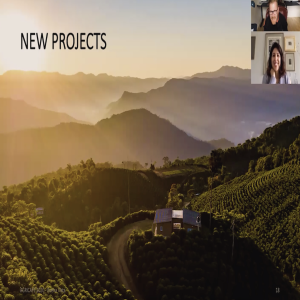
Saturday Jun 06, 2020
Episode 604: Bolivia La Linda Washed Caturra
Saturday Jun 06, 2020
Saturday Jun 06, 2020
Coffee production in Bolivia was traditionally concentrated in the region of Los Yungas, where lush sub-tropical vegetation and environmental conditions helped to produce the amazing-quality Bolivian coffee that we all know and love.
Caranavi is located north of the department of La Paz city. It's 150 kilometres from the capital, and it is the centre of Bolivian coffee production. Its fertile soils and altitude give Bolivia the potential to produce brilliant and unique coffees.
Due to the many complications and challenges within the Bolivian coffee industry, many of the smaller farms we have worked with in the past are no longer producing coffee. Whilst this has created some challenges for us, it has had a much more significant impact on our exporting partners AgriCafe, who have been working with these growers for many years. As a result, they have decided to begin farming themselves, in an effort to demonstrate what can be achieved with the application of more modern techniques and a scientific farming approach.
Agricafe manages seven farms, of which La Linda was the first to bear fruit a few years ago. La Linda is known as The Seed Garden for the other farms in the Buena Vista project. Alongside this Caturra lot, the farm is producing Longberry, Catuai and Typica lots; it's also producing Java, SL28 and Bourbon, which are all relatively new plantings in Bolivia.
It's a Cadbury's Whole Nut, with some macadamia nuts mixed in. This is a great example of just how good a simple coffee can be - the smooth texture, chocolate sweetness and nutty finish is just an incredibly chuggable brewed coffee and a fantastic classic style espresso.
- Country: Bolivia
- Region: Yungas
- Province: Caranavi
- Colony: Bolinda
- Farm: La Linda
- Altitude: 1,400 - 1,450 m.a.s.l.
- Processing Method: Washed
- Varietal: Caturra
CUPPING NOTES
Cadbury's Whole Nut, macadamia nut
Clean Cup: (1-8): 6
Sweetness: (1-8): 7
Acidity: (1-8): 6
Mouthfeel: (1-8): 6.5
Flavour: (1-8): 7
Aftertaste: (1-8): 6
Balance: (1-8): 7
Overall: (1-8): 6.5
Correction: (+36): +36
Total: (max 100): 88
Roasting Information
Medium-dark - keep it steady and aim for the first pops of second on the drop.
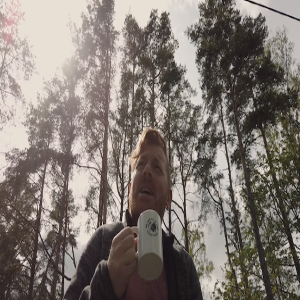
Saturday May 30, 2020
Episode 603: Nicaragua El Encanto Washed Caturra
Saturday May 30, 2020
Saturday May 30, 2020
Another one from our very good friends indeed, the Mierisch family!
Encanto was actually one of the very first farms the family owned, although originally not for coffee, but cattle. It's still largely a cattle farm to this day, and alongside those cattle come horses too! On my last visit to Nicaragua earlier this year, instead of walking around the farm, we rode on horses like real cowboys (except for me, I had a mule as I’m no cowboy!).
The farm is large, and the land is diversified, which means it produces amazing coffee. Like all the family's farms, everything at El Encanto is really centered around the people who work there, providing great resources such as pre-school facilities, housing, a small shop, water and electricity, and healthcare.
Because of its previous life exclusively as a cattle farm, there's plenty of shade on the farm, which is super beneficial for the coffee plants' growth. By shading the coffee from direct sunlight as it grows, the plants are able to develop at a slower rate. This allows the natural sugars in the coffee cherry to mature and gives the coffee itself a sweeter flavour which you can definitely taste in the cup in this coffee!
There's a rush of dark chocolate at the beginning but it's underpinned by a sweetness of digestive biscuit. On the finish is a little delicate red grape and then in the aftertaste comes walnuts.
- Country: Nicaragua
- Municipality: Matagalpa
- Region: San Ramon
- Farm name: El Encanto
- Producers: The Mierisch Family
- Altitude: 900 masl
- Varietal: Caturra
- Processing method: Washed
CUPPING NOTES
Dark chocolate, digestive biscuit, red grape, walnut
Clean cup: (1–8): 6
Sweetness: (1–8): 6.5
Acidity: (1–8): 6
Mouthfeel: (1–8): 6
Flavour: (1–8): 6.5
Aftertaste: (1–8): 6
Balance: (1–8): 6.5
Overall: (1–8): 6.5
Correction: (+36): +36
Total: (max. 100): 86
Roast Information
Medium-dark - through first and give it some time to develop, dropping it just with the very first pops of second in the cooling tray.
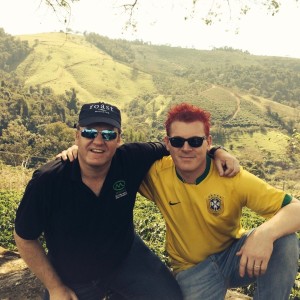
Saturday May 23, 2020
Episode 602: Brazil Fazenda Inglaterra Natural Bourbon CoE Entrant
Saturday May 23, 2020
Saturday May 23, 2020
Fazenda Inglaterra is a farm we've been buying from for over a decade, and it's one that I am very proud to be working with and linked with. The owner is my very good friend, Stephen Hurst.
Each year, Stephen (can I just call him Hursty from now on?!) picks a lot from his farm to enter into the Cup of Excellence competition. Unusually, there are separate competitions for Pulped Natural and Natural processed coffees in Brazil. Hursty competed with a Natural this year.
Unfortunately for him, this lot was a hair’s breadth short of making it through. That works out well for us because it’s a really delicious coffee that we can now enjoy!
To tell the story of Inglaterra, I'll hand this over to Hursty to tell you how he came to own 'Inglaterra':
“Maybe it had always been an idea in the back of my mind – so a couple of years ago when some friends in Brazil mentioned that a small coffee farm was for sale, I had a look.
The farm's name (Fazenda Toca Da Onca) means 'hiding place of a small wildcat'. The locals now call the farm 'Inglaterra'. The previous owners had abandoned Toca Da Onca/Inglaterra. So we had to start again, almost from scratch. Some surviving coffee trees were pruned right back and the coffee that you are now drinking is that re-growth from the original old trees.
For the coffee people, the varietals are Icatu, Acaia and Catucai. In future I expect coffee cherry varietals to become as well known as wine grape varietals, and to a much wider audience. The farm is located near the lovely spa town of Poços De Caldas in the coffee-growing heartlands of Brazil’s Minas Gerais state. The farm's elevation is 950–1300 metres, and it has rich soil. It's on the edge of an ancient caldera/super volcano, whose outline can be seen on satellite images. 50% of the farm is virgin Mata Atlantica forest and as long as I own it, it will stay that way. I am replanting some areas with the help of my local friends Gabriel and Cristiano, without whose assistance this project would never have started."
- Country: Brazil
- Region: Minas Gerais
- City: Poços de Caldas
- Farm: Fazenda Inglaterra
- Owner: Stephen Hurst
- Farm size: 10 hectares
- Coffee growing area: 5 hectares
- Altitude: 1,200 m.a.s.l.
- Varietal: Bourbon
- Processing method: Natural
CUPPING NOTES
Milk chocolate, caramel, almond, hazelnut, sultana
Clean cup: (1–8): 6
Sweetness: (1–8): 7
Acidity: (1–8): 6.5
Mouthfeel: (1–8): 7
Flavour: (1–8): 6.5
Aftertaste: (1–8): 6.5
Balance: (1–8): 6.5
Overall: (1–8): 6
Correction: (+36): +36
Total: (max. 100): 88
Roast Information
Medium-dark - through first crack and keep it going steadily towards second, but finishing the roast with no more than the very first pops of second in the cooling tray.
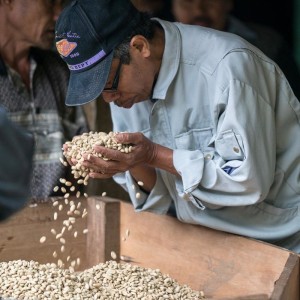
Saturday May 16, 2020
Episode 601: Sulawesi Tana Toraja Kalosi A Washed
Saturday May 16, 2020
Saturday May 16, 2020
Sulawesi was formerly known as Celebes. Along with the rest of Indonesia, it was under Dutch control from the early 1600s until World War II. Coffee production in Indonesia was introduced and dictated by the Dutch East India Company. The first Typica plants arrived in 1750, as they had begun to be spread around the other islands of Java and Sumatra.
The most famous coffees from Indonesia are those from the island of Sumatra, and they're processed as wet hulled coffees. This lends them their characteristic earthy, savoury, and sometimes almost meaty flavours.
Sulawesi, on the other hand, primarily produces washed coffees for export, and our partners there at TOARCO (a Japanese-Indonesian joint mill and export venture) are experts at producing clean, sweet, and fruity coffees that we really enjoy.
TOARCO owns the Pedamaran Plantation at 900–1,250 metres above sea level. It also purchases wet parchment (at 40% moisture) coffees from small producers at collection points in Perangian, Pango Pango, Minanga, and Perindingan. Once collected, the coffee is trucked to Pedamaran Plantation immediately after purchase. When it gets there it's dried using mechanical Yamamoto vertical dryers and Pinalhalense guardiolas, or horizontal dryers like those often found throughout Colombia. The mechanical dryers assist in maintaining uniform drying, and this helps the processing go more efficiently and cleanly. The drying typically takes 72 hours.
If a producer wants to sell their parchment coffee to TOARCO, they need to get certified to the quality standards in selective picking, storage, transportation, moisture levels, and so on. Farmers are issued ID cards that allow them to sell their coffee at various purchasing points in the Tana Toraja region during the market week.
TOARCO is focused on providing education and support to its producer partners. Currently, the company offers once-yearly classes for producers to receive their ID cards, but they hope to expand their educational opportunities to twice yearly and include things such as cherry selection, planting and picking techniques, and fermentation. They also hold a party at the end of the harvest cycle to celebrate, giving out awards to producers. The rewards include things such as depulpers and other necessary tools. Between 150 and 200 producers attend the party every year.
Most of the coffee produced in Toraja is of the S795 varietal (the S stands for 'section'). It is thought to be the cross of S288 (a natural hybrid of Liberica and Arabica) and an old Kent varietal (a Typica variety that has been adapted to growing conditions in India). S795 is the most commonly-planted Arabica coffee in India and southeast Asia, and it was one of the first coffee leaf rust-resistant varieties to be discovered. It is also commonly known as 'Jember' thanks to the Jember Indonesian Coffee and Cacao Research Institute (ICCRI), whose staff first introduced it to the coffee farmers of Indonesia.
This coffee is big and bold. There are bags of dark treacle with a delicate zing of dried cranberries and goji berries, and then it finishes with dark chocolate.
- Country: Indonesia
- Island: Sulawesi
- Region: Toraja
- Altitude: 1,400–1,600 m.a.s.l.
- Producers: Various smallholder farmers of Perangian, Pango Pango, Minanga, and Perindingan
- Processing method: Washed
- Drying method: Yamamoto vertical dryers, and Pinhalense guardiola
- Drying time: 72 hours
- Varietal: S795
- Grade: A
CUPPING NOTES
Treacle, dried cranberries, goji berries, dark chocolate
Clean cup: (1–8): 6
Sweetness: (1–8): 6.5
Acidity: (1–8): 6.5
Mouthfeel: (1–8): 6.5
Flavour: (1–8): 6.5
Aftertaste: (1–8): 6
Balance: (1–8): 6.5
Overall: (1–8): 6
Correction: (+36): +36
Total: (max. 100): 86.5
Roast Information
Medium-dark to dark – we prefer this pushed steadily to the edge of second to let all the flavours shine, but it'll take a slightly slower and darker roast if you want to reduce the acidity and focus on the heavy body.
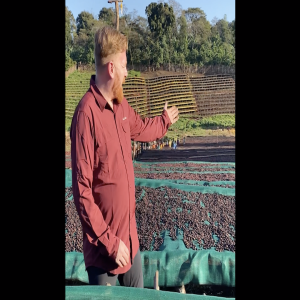
Saturday May 09, 2020
Episode 600: Ethiopia Sharo Natural
Saturday May 09, 2020
Saturday May 09, 2020
DETAILS
The Sharo washing station belongs to Israel Degfa, who also brings us the wonderful Ana Sora coffee each year. Sharo is located near to the town of Bule Hora, which is in the Sidamo region and a bit south of Yirgacheffe town.
Sharo is a washing station that collects coffee cherries from local smallholders and processes them. As you'll have seen if you've had the Ana Sora coffee for the last few years, Israel is very focused on continually improving.
He's constantly improving the setup at the washing stations, and he keeps pushing to improve consistency and attention to detail in all the coffee production. That's especially difficult when you're buying the coffee cherries from many local farming families, but lots of work has gone into supporting local growers and helping them do a better job – and helping them earn more by doing so.
This coffee really jumped out at us as we tasted some of Israel's coffees. Very different to our beloved Ana Sora, this was heavier in body and darker in flavours, but it's a really interesting and different coffee that showed another side of what Natural processing can bring. The big shock came when we looked at the information and discovered it was a Grade 2!
What does that mean? Good question!
All coffee sold in Ethiopia gets graded by the Ethiopian Coffee Exchange (ECX). The visual quality of the green beans – any defects or damage – is assessed, and the coffee is cupped to see how it tastes. Between these factors, a coffee is given a grade from 1 (the best) to 5 (the worst), with grades 1 and 2 being considered Speciality coffee. So in theory, this coffee isn't quite as good as the Ana Sora (Grade 1), nor in fact as good as most of the other coffees we see from Ethiopia.
Of course, we wouldn't have bought this coffee if we agreed with that. Whilst we don't rate it quite as highly as our lots from Ana Sora, it's still a great coffee and far better than many Grade 1 lots we've looked at in the past.
There's loads of rich dark chocolate here, but it's got a boozy hit of cherry brandy in there too. It's all got a thick, gloopy texture, but juicy cherry takes centre stage on the aftertaste and draws you back in for another sip of the chocolate.
- Country: Ethiopia
- Region: Sidamo
- Nearest town: Bule Hora
- Owner: Israel Degfa
- Washing station: Sharo
- Varietals: Indigenous wild
- Processing: Natural
CUPPING NOTES
Dark chocolate, cherry, brandy
Clean cup: (1–8): 6
Sweetness: (1–8): 7
Acidity: (1–8): 6.5
Mouthfeel: (1–8): 7
Flavour: (1–8): 6.5
Aftertaste: (1–8): 6
Balance: (1–8): 6
Overall: (1–8): 6
Correction:(+36): +36
Total (max. 100): 87
Roast Information
Medium – push this into the gap with a nice and steady pace, and then finish the roast before second gets going.

Friday May 01, 2020
Episode 599: Nicaragua Finca Limoncillo Washed Caturra
Friday May 01, 2020
Friday May 01, 2020
I've been telling the story of Hasbean and Finca Limoncillo for many, many years now. I don't intend to stop any time soon because it's such a big, big, big relationship for me. 😊
So much of where we are today has come from this relationship. I'm really proud of everything that's happened in the past, and super excited for where we can go in the future.
Our relationship with Finca Limoncillo began in 2007, and back then we were buying their delicious coffee as part of a buying group. I loved it from the very first time I cupped it, and it was a coffee I just had to get. It was only after the auction closed that I discovered it was owned by a family in Nicaragua who were already good friends of mine, and indeed probably the only people I knew from the whole country!
The following year I visited the farm with our importers, and I spent the whole trip begging them to bring the coffee into the UK for us. Eventually, thanks to my supreme Steve pester power, they caved in (probably just to stop the flow of emails and phone calls!) and kindly did so.
This setup worked well for a time, but we received notice a couple of years ago that the importers were not going to be buying the coffee again (and for reasons other than the cup quality). This led to some frantic phone calls and a thorough search down the back of the sofa for loose change to fund buying twelve months’ worth of coffee all at once. There were many, many obstacles in the way of doing this deal, but we were lucky in that we were able to pull everything together in a very short amount of time.
The upside of all of this is that we now work directly with Finca Limoncillo instead of going via anyone else, and this is a relationship I’m super happy to have. This coffee has gone from a one-off Cup of Excellence buy to a fantastic long-term relationship that I'm so very proud to have.
Finca Limoncillo is located in Matagalpa and, at 171 hectares in size, it. is. huge! Situated at an amazing location, it boasts nine waterfalls within the farm and is owned by the Mierisch family; as I have already said, they’re good friends, and also well-respected producers in Nicaragua. They’re known for their experimental processing, varietal work, and exceptional coffee.
The fact that the family are friends helps us drill down into the details of what they do for the people who work for them. The information continues to prove to me that good people grow good coffee.
Every year this manages to deliver the same cup, which always reminds me of a toffee apple. This year is no exception: it has sweet toffee on the front and a balanced acidity of green apple following up. There's a little milk chocolate mixed in there too this year, but it keeps that fantastic balance that makes this so moreish.
- Country: Nicaragua
- Municipality: Yasica Norte
- Region: Matagalpa
- Farm name: Limoncillo
- Producers: the Mierisch family
- Farm size: 171 manzanas (hectares)
- Coffee growing area: 109 hectares
- Altitude: 1,200 m.a.s.l.
- Varietal: Caturra
- Processing method: Washed
CUPPING NOTES
Toffee, green apple, milk chocolate
Clean cup: (1–8): 6
Sweetness: (1–8): 7
Acidity: (1–8): 6.5
Mouthfeel: (1–8): 6
Flavour: (1–8): 6.5
Aftertaste: (1–8): 6
Balance: (1–8): 7
Overall: (1–8): 6
Correction: (+36): +36
Total: (max. 100): 87
Roast Information
Medium-dark – through first crack, slow it down a little in the gap and drop it just with the first pops of second; no more.
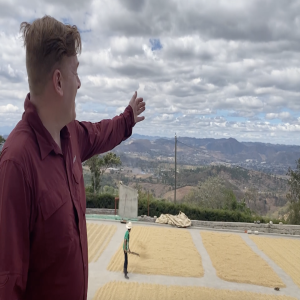
Saturday Apr 25, 2020
Episode 598: Guatemala El Limon Natural Caturra
Saturday Apr 25, 2020
Saturday Apr 25, 2020
I first discovered El Limon on my trip to Guatemala in early 2013. At the time we'd never bought coffee directly from Guatemala, but since then this has become one of our strongest and most amazing Hasrelationships.
My friend Raul (whom you may remember as the World Barista Champion of 2012!) in Guatemala had been buying coffee from these guys for a couple of years, and he was very keen for me to go and meet them. Located around an hour's drive to the east of Guatemala City in the small town of Palencia, this farm sits at an altitude between 1,600 and 1,800 metres above sea level. It's owned by Guadalupe Alberto Reyes, who's also just known as Beto. He used to be the Mayor of Palencia, and he helped to build and develop the town.
Palencia is not part of the eight regions of coffee as defined by Anacafé, but you can see a lot of development in the zone, and this farm is a perfect example of that development. I like being in places that are working to be hot and up-and-coming, as well as those that are established players.
One of the main reasons I love El Limon is Beto's desire to experiment; the farm mostly produces Bourbon and Caturra, but he also plays around with a few other varietals. The experimentation is thanks to Beto's motivation; he has really focused on the farm over the last few years. He wanted to take more care in every step they take – from picking to processing, to shipping – and also take more care in the agronomy of the farm.
This is very much a family affair: his wife and son also work on the farm, along with Beto's siblings. In fact, his son is studying agronomy at the local college for the benefit of the farm.
The dedication and care devoted to each step of production is reflected in the fact that the family has built a new wet mill, so that they can separate different lots and have control over the quality of the coffee. Previously the mill could process only one lot; now the farmers are able to process many lots, and keep separate days' pickings and varietals in their own parcels.
With this wet mill came another opportunity, which was for neighbours and people within the region of Palencia to bring their coffees to the mill where they could get them processed. It's another sign that this is a hot spot for Guatemalan coffee.
As time moves on, Beto doesn't want to stand still and is continuing to invest in the farm. He showed me lots of new planting during my recent visit, and a lot of building work around the wet mill. He is also building a QC lab and new accommodation for people working on the farm. It was a real hive of activity.
Beto and his family have always been the perfect hosts whenever I visited the farm. They are such welcoming people and take great pride in showing me around their farm. One of the kindest things they've done for me is to welcome me into their home when I am visiting, and they always prepare the most amazing meals! When you travel as much as I do, mid-trip you find yourself longing for something big, home-cooked, and not from a restaurant or roadside pop-up cafe. Traditional Guatemalan meals are just the ticket, and I always look forward to the food – but mainly I look forward to the company.
Here’s a slice of apple pie for you! Alongside stewed apples and sweet pastry is a hint of lemon zest. Then a dollop of brandy butter kicks in, with a creamy texture and that hit of booze.
- Country: Guatemala
- Region: Palencia
- Farm: El Limon
- Producer: Guadalupe Alberto 'Beto' Reyes
- Altitude: 1,600 m.a.s.l.
- Varietal: Caturra
- Processing method: Natural
CUPPING NOTES
Apple pie, brandy butter, lemon zest
Clean cup: (1–8): 6
Sweetness: (1–8): 7
Acidity: (1–8): 6.5
Mouthfeel: (1–8): 6.5
Flavour: (1–8): 7
Aftertaste: (1–8): 6
Balance: (1–8): 6.5
Overall: (1–8): 6
Correction: (+36): +36
Total: (max. 100): 87.5
Roasting Information
Medium-dark - like other naturals, this will go quickly once you're in crack. Very similar to other lots from the farm, this needs a bit of development and a bit of heat so look for those first pops of second on the drop.
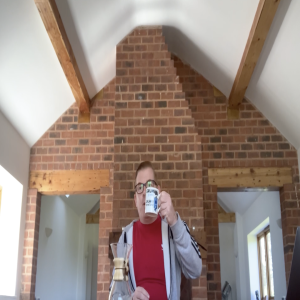
Saturday Apr 18, 2020
Episode 597: Bolivia Vincent Paye
Saturday Apr 18, 2020
Saturday Apr 18, 2020
A few years back we had a lot that was produced by various smallholder farmers from the small town of Copacabana, which lies about 180 kilometres from La Paz in the heart of the Caranavi coffee-producing region. Then in 2016 things changed a little, and the lot came from just one producer in the area. His name is Vincent Paye. That year I described him as a beacon of hope in a tough growing region, and that beacon has continued to shine brightly.
Caranavi is a lush and fertile region. It has steep slopes and valleys that provide excellent conditions for growing high quality coffee, and they also support a diverse range of native flora and fauna. The area has rich volcanic soils and regular rainfall. Coffee growing heaven!
The colony of Copacabana has a collection of small farms that are each around five hectares in size (although Vincent has ten hectares). The farms range over an altitude of 1,300 to 1,700 metres above sea level (m.a.s.l.), and they benefit from an average annual temperature between 15 and 26°C. This lot comes from Vincent's farm, which is very similar to neighbouring farms and is at an altitude of around 1,550 m.a.s.l. These traditional farms use no chemicals or pesticides and are certified organic, although we do not currently hold an organic certification ourselves.
The main harvest runs from May to September, peaking around July and August. The cherries are handpicked when they're fully ripe, and they're then delivered to the central mill, called Buena Vista, where they are fully washed.
Bolivia is a challenge and is going through some tough times: dwindling crops, ageing plants, lack of varietal diversity, and ageing producers with children who have little to no interest in carrying on the family business. But then there are people like Vincent who are doing wonderful work to buck that trend. He's been planting new stock, working hard with his family, and increasing his yield – and also increasing the quality of his coffee.
Imagine a fresh segment of orange, with chocolate drizzled all over it. Behind that, there's a sweetness which reminds me of dark honey, then on the aftertaste a delicate dried apricot.
- Country: Bolivia
- Region: Yungas
- Municipality: Caranavi
- Town: Copacabana
- Farm: Vincent Paye
- Altitude: 1,550 m.a.s.l.
- Producer: Vincent Paye
- Varietal: Red and Yellow Caturra
- Processing: Washed
CUPPING NOTES
Orange, chocolate, dark honey, dried apricot
Clean cup: (1–8): 6
Sweetness: (1–8): 7
Acidity: (1–8): 6.5
Mouthfeel: (1–8): 6
Flavour: (1–8): 7
Aftertaste: (1–8): 6.5
Balance: (1–8): 6
Overall: (1–8): 6.5
Correction: (+36): +36
Total: (max. 100): 87.5
Roast Information
Medium to medium-dark - Through first at a nice steady pace, then push it towards second but drop with no more than the very first pops as it cools.
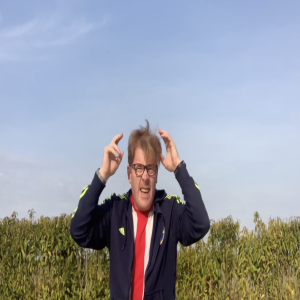
Saturday Apr 11, 2020
Episode 596: Ecuador Perla Chiquita AAA Washed Bourbon
Saturday Apr 11, 2020
Saturday Apr 11, 2020
In 1998 Fabián Lomas worked in Quito for a company that bought and sold coffee. During his time working for this company he was able to learn a lot about coffee, and about coffee production and processing methods. Fast forward ten years to 2008: Fabián decided to take a big risk and rent a piece of land to produce his own coffee. He had the eventual goal of making enough money to buy his own land.
From the very beginning Fabián was familiar with speciality coffee, and he wanted to start his farm off on the right foot. He took lots of care in the processes carried out on the farm to produce great tasting coffee. Fabián is currently trying to involve his two children, Willy and Lizeth, in the farm's operating procedures. Every time someone visits, Fabián encourages his children to show the guests around; he wants them to take over running the business one day.
Willy graduated from high school in 2016. Since then he has been working with his father, learning more about coffee production, and taking care of the agricultural management of the coffee trees. For instance, Willy and Fabián are in charge of weed management, fertilization, and harvesting. Lizeth not only takes care of the drying and hand-sorting of the coffee, but she also owns a garden centre.
Fabián's family have passed through hard economic moments in their lives, which has led to lack of fertilization. That in turn resulted in diseases affecting the harvest. However, now with the help of our exporting partners Caravela, they have been able to improve their economic situation and build a drying station, and their next plan is to finally buy the land to have their own farm.
What jumps out first is brown sugar - think dark, heavy demerara. Alongside that is a creamy body with a grating of lime zest and a delicate mango too.
- Country: Ecuador
- Parroquia: Pichincha
- Cantón: Nanagal
- Farm: Perla Chiquita
- Producer: Luis Fabián Lomas
- Altitude: 1,300 m.a.s.l.
- Total farm size: 5 hectares
- Coffee producing area: 1.5 hectares
- Varietal: Bourbon
- Processing method: Fully washed and fermented without water
- Fermentation time: 14 hours
- Drying method: Covered patios
- Drying time: 7–15 days
CUPPING NOTES
Demerara sugar, mango, lime zest
Clean Cup: (1-8): 6
Sweetness: (1-8): 7
Acidity: (1-8): 6.5
Mouthfeel: (1-8): 7
Flavour: (1-8): 6.5
Aftertaste: (1-8): 6
Balance: (1-8): 6.5
Overall: (1-8): 6.5
Correction:(+36): +36
Total (max 100): 88
Roasting Information
Medium to medium-dark - through first and give it some development. Pushing it up to the first pops of second and the brown sugar will shine, or keep it in the gap to highlight the fruit notes.
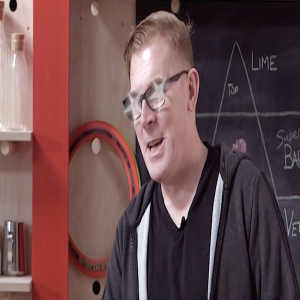
Saturday Apr 04, 2020
Episode 595: Brazil Fazenda Inglaterra Natural Canario
Saturday Apr 04, 2020
Saturday Apr 04, 2020
We've been buying from Fazenda Inglaterra for over ten years, and it's a farm that I am very proud to be working with and linked with, as well as the owner (and my very good friend) Stephen Hurst.
To tell the story of Inglaterra, I'll hand this over to Stephen of the Hurst variety to tell you how he came to own 'Inglaterra':
“Maybe it had always been an idea in the back of my mind – so a couple of years ago when some friends in Brazil mentioned that a small coffee farm was for sale, I had a look.
The farm's name (Fazenda Toca Da Onca) means 'hiding place of a small wildcat'. The locals now call the farm 'Inglaterra'. The previous owners had abandoned Toca Da Onca/Inglaterra. So we had to start again, almost from scratch. Some surviving coffee trees were pruned right back and the coffee that you are now drinking is that re-growth from the original old trees.
For the coffee people, the varietals are Icatu, Acaia and Catucai. In future I expect coffee cherry varietals to become as well known as wine grape varietals, and to a much wider audience. The farm is located near the lovely spa town of Poços De Caldas in the coffee-growing heartlands of Brazil’s Minas Gerais state. The farm's elevation is 950–1300 metres, and it has rich soil. It's on the edge of an ancient caldera/super volcano, whose outline can be seen on satellite images. 50% of the farm is virgin Mata Atlantica forest and as long as I own it, it will stay that way. I am replanting some areas with the help of my local friends Gabriel and Cristiano, without whose assistance this project would never have started."
Back to Stephen of the Leighton variety!
After Stephen bought the farm there was one varietal he decided to add to the plant stock that wasn't already there, and that varietal was Canario. It's one of those varietals you would never plant if you had to survive on coffee for your living – pests love it, its yield is really low and the slightest change in temperature will result in frost burn; a point proved a few years back when a cold snap experienced in Poços de Caldas left over 25% of this crop damaged.
So why grow it then? Well, it produces some of the most delicious coffee you can imagine. Also, it's something that Stephen had always wanted to ask producers to try but was too afraid to ask, so he just went ahead and did it himself!
Jump right into this when it's very hot and it's all dark chocolate, but as it begins to cool a little you'll get that shifting towards milk chocolate. It's joined by a hit of pecan nuts too and just a maple sweetness too. There's a hint of fruit too - think dried apricot pieces - for a very well balanced and more-ish coffee.
- Country: Brazil
- Region: Minas Gerais
- City: Poços de Caldas
- Farm: Fazenda Inglaterra
- Owner: Stephen Hurst
- Farm size: 10 hectares
- Coffee growing area: 5 hectares
- Altitude: 1,200 m.a.s.l.
- Varietal: Canario
- Processing system: Natural
CUPPING NOTES
Milk chocolate, dark chocolate, pecan, maple, dried apricot.
Roast Information
Medium Dark - through first and give it a little time in the gap to develop, dropping it and looking for the very first pops of second as it cools.
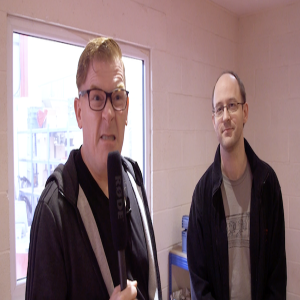
Saturday Mar 28, 2020
Episode 594: Bolivia Bebeto Mamani Washed
Saturday Mar 28, 2020
Saturday Mar 28, 2020
The name of this coffee producer may sound a little familiar: Bebeto ('Beto' for short) is the son of the legend that is Teodocio Mamani. Teodocio owns Finca Canton Uyunense, which is a farm we have worked with since 2012.
His farm is located in 18 de Mayo, which is a municipality of Caranavi (and part of canton Uyunense). Lots of farms can be called a variation on these names because the land traditionally tends not to have a name.
This year is the fifth year that Bebeto has grown coffee under his own guardianship, and it's the fourth year that he has processed it himself too. Just like previous years, and as you'd expect from a Mamani, the results are delicious.
Bebeto used a depulper to remove the cherry, then left the coffee to go through a dry fermentation process for 16–18 hours, and then ran it through the scrubber section of the pulper to remove the final remains of the mucilage. Bebeto then transferred the coffee to raised African beds, where it dried in around 7–9 days.
The picking method Bebeto uses is called 'Ayne'. It's the same method his dad uses on Canton Uyunense. This method involves selective picking (not stripping the tree, like their neighbours do), and it demands much more labour and incurs much higher costs. But because of this method, Bebeto gets more coffee he can sell as specialty, and the cup profile is improving year after year.
This coffee starts with chocolate, with just a hint of red apple peel mixed in. That sweetness keeps going, but shifts towards soft brown sugar on the finish. The delicate fruit hints also shift at the end, leaving an unusual aftertaste which reminds me of lychees, but pulls you back for more of that chocolate.
- Country: Bolivia
- Department: La Paz
- Region: Yungas
- Province: Caranavi
- Municipality: 18 de Mayo
- Producer: Bebeto Mamani
- Varietals: Caturra
- Altitude: 1,600–1,750 m.a.s.l.
- Processing method: Washed
- Fermentation: 16–18 hours
- Drying method: Raised beds
- Other crops grown: citrus, papaya, banana, wild forest
CUPPING NOTES
Chocolate, red apple peel, brown sugar, lychee.
Medium Dark - through first crack, slow it down a little but keep pushing it towards second crack. Don't let second crack get going - you're looking for the very first pops of it as the roast finishes, no more.
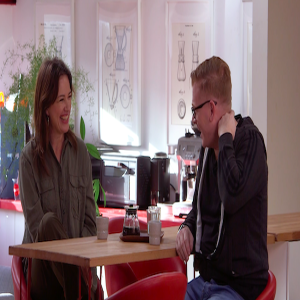
Saturday Mar 21, 2020
Episode 593: El Salvador Finca Los Andes Washed SL28
Saturday Mar 21, 2020
Saturday Mar 21, 2020
An In My Mug exclusive coffee sent only to subscribers on Friday the 20th of March, 2020.

Juan Jose Ernesto Menéndez Argüello belongs to the fourth generation of coffee farmers in his family. His father died in 1995, and after completing his studies at university he had the opportunity to start working in the coffee industry at J. Hill & Cia in 2000. After five years he left J. Hill & Cia to begin his second experience at JASAL. Both companies gave him the opportunity to meet “Grano de Oro” from another perspective, allowing him to learn the art and passion of cupping. He says those are very important in his life, and that they give him the opportunity to apply his coffee knowledge and experience gained through the years.
During his time in the coffee world, Neto has participated in various events like the Cup of Excellence (National Jury from 2003 to 2011), Q Auction, Q Grader, and the Star Cupper program organised by SCAA and CQI.
You can normally only taste coffee from this farm when it's roasted by Drop Coffee in Stockholm as it's an exclusive farm to them, however, as a special 1 off we reached out to Joanna and she very kindly agreed to share some Los Andes with us just for all you lovely In My Mug subscribers.
A super elegant and complex cup, this one makes me think of cloudy lemonade - there's even an effervescent acidity to it. It's got a creamy body where the lemon shifts into clementine, with a slight floral hint. On the finish, I get soft marzipan. This is a great example of what you can get from SL28 plants combined with the best Salvadorean soil.
- Country: El Salvador
- Department: Sonsonate
- Nearest City: Santa Ana
- Farm: Finca Los Andes
- Producer: Ernesto Menéndez
- Altitude: 1,720 m.a.s.l.
- Variety: SL28
- Processing System: Washed
CUPPING NOTES
Cloudy lemonade, clementine, floral, marzipan
Clean Cup: (1-8): 7
Sweetness: (1-8): 7
Acidity: (1-8): 7
Mouthfeel: (1-8): 6.5
Flavour: (1-8): 7
Aftertaste: (1-8): 6.5
Balance: (1-8): 6.5
Overall: (1-8): 7
Correction:(+36): +36
Total: (max 100): 90.5
Roasting Information
Medium - not too far! Keep this medium - through first at a steady pace and push it into the gap, dropping before you reach second.

Saturday Mar 14, 2020
Episode 592: Costa Rica Finca Licho Yellow Honey Geisha
Saturday Mar 14, 2020
Saturday Mar 14, 2020
Licho's is a coffee that I feel shows our development as a roaster over the years. We first bought this coffee in the Cup of Excellence program (a great way to meet a grower). Back then we bought it from an import broker; they helped us bring this coffee in because we were a small buyer. Now we buy directly from the farm!
Four years ago I went out to the farm and did the deal then and there with the brothers. I love the fact that I simply walked onto the farm after cupping a particular lot in the exporter's office, asked how much they wanted, and there was a short conference. They came back and told me how much they wanted, and we shook hands. Then we got back into the 4x4 and drove away. That year we agreed to a European-exclusive deal with them for this coffee, and this year we continue the close work we have been doing with them.
Grown by the Aguilera family in the province of Naranjo, in the volcanic Northern Cordiles corridor of the Western Valley, this coffee is cultivated at an altitude of 1,500 metres above sea level. Most of their coffee is either Villa Sarchi or Bourbon, but in recent years we've started to see other varietals from the farm.
The brothers work the mill and farms themselves. They have basically no hired labour, except for pickers during the harvest. With the help of the third generation, they work the mill and drying patios, prune the coffee fields, fertilise, and so on; and they do it all year round.
The Aguilera brothers understand quality at the farm and mill level, and this is why we are excited about working with them. Most of the siblings own farmland as well as co-managing the micro mill they installed eight years ago, which they built with the earnings from their fourth-place Cup of Excellence win in 2007. That's the year I first found the farm!
This coffee is yellow honey processed, which is just like the Pulped Natural method. The fruit is removed from the seed of the coffee bush and left to dry. The main difference is that there is no water involved when the cherry is removed, so mucilage sticks to the bean. This can be dangerous, but it's necessary in these parts of Costa Rica where water is limited: water is a precious commodity in this area of Naranjo, so this method suits the location very well.
The coffee ends up clustering whilst drying because there is so much mucilage. So the coffee either needs to be turned regularly to stop this happening, or it has to be broken up. Over-fermentation can happen at this stage and you can end up with a not-so-good cup, but the Aguilera brothers are well-versed in this method and are some of the most skilled in Costa Rica.
Want to know a little more about Honey processing? Here's a video you might enjoy!
Geisha is a varietal that has attracted lots of attention among coffee buyers and farmers, with some super high prices being paid for tiny lots. The name comes from the Gesha village in Ethiopia, where it’s said to have come from. I say 'said to' because it’s believed that coffee stock from this region made its way to Costa Rica (and then on to Panama) in the 1950s, but didn’t find much favour in its new home.
As with other experimental varietals that didn’t do particularly well, the plants were largely ignored or forgotten. Some grew wild or mixed into difficult-to-reach corners of farms. That means it’s difficult to be sure how close what we now call 'Geisha' is to those seeds from Ethiopia many years ago. Regardless, Geisha’s reputation suddenly hit the big time around 2004 as it attracted praise (and high prices) in the Taste of Panama competition, and it became a must-try for all you coffee geeks out there.
There has been talk of the name – Geisha vs Gesha – and we like to listen to the people that grew the coffee. It says 'Geisha' on our bags from the farm, so we're going with 'Geisha'.
It’s a spindly plant that needs quite a lot of space and care, but the distinctive floral flavours it delivers have seen it being planted more and more throughout Panama and Costa Rica. It's also slowly appearing in other countries where producers are looking to experiment with new varietals.
The Aguileras are a family of twelve brothers and sisters who are second-generation coffee producers in the West Valley. (Hermanos is used to describe mixed male and female siblings in Spanish, but literally translates to 'brothers' in English.) Their father was one of the first coffee growers in the area, and planted his farm 70 years ago. Neighbouring farmers warned him that coffee wouldn't grow there, but now the area is rich with coffee lands and his children work together to produce coffee.
Expect the classic floral notes of Geisha, but backed up by a silky body and big fruit sweetness and acidity. There's crisp green apple alongside juicy yellow plum before apricot takes over for the finish, and there's a squeeze of lemon in there too.
- Country: Costa Rica
- Region: Western Valley
- Province: Alajuela
- Nearest city: Naranjo de Alajuela
- Farm: Finca Licho
- Producers: Aguilera family
- Farm size: 28 hectares
- Coffee growing area: 9.10 hectares
- Altitude: 1,500 m.a.s.l.
- Varietal: Geisha
- Processing system: Yellow Honey
CUPPING NOTES
Green apple, yellow plum, apricot, lemon
Clean cup: (1–8): 6.5
Sweetness: (1–8): 7
Acidity: (1–8): 7
Mouthfeel: (1–8): 7
Flavour: (1–8): 8
Aftertaste: (1–8): 6
Balance: (1–8): 6
Overall: (1–8): 7
Correction:(+36): +36
Total: (max. 100): 90.5
Roasting Information
Medium-light – slow this down as it comes to the end of first to develop those big fruit flavours, but don't let it get too far into the gap and definitely nowhere near second.

Saturday Mar 07, 2020
Episode 591: Guatemala Finca La Soledad Washed 67-hour Fermented Caturra
Saturday Mar 07, 2020
Saturday Mar 07, 2020
Raul Pérez has grown up around coffee. He comes from a fifth-generation coffee farming family on his father's side, and a third-generation family on his mother's side. Coffee has always been part of his life. He has told me about the stories his grandparents shared with him about their experiences.
But I think it's fair to say that Raul has made plenty of his own coffee stories in his ten years of involvement in the specialty coffee industry.
It was ten years ago when Raul first became involved in the family business. After living in Guatemala City in his youth (so he was able to go to a good school and university), he returned to the farm where his family had still been working and commuting.
This coincided with a visit from an international buyer who made the family view coffee production in a different way. The speciality market was blossoming and the visitor gave them new ideas for varietals, picking, and processing that changed the direction of their farm and their cup quality. As Raul puts it, they began to work in a 'more interactive way'.
Finca La Soledad has been a Pérez family coffee farm since 1895. The farm is located in Acatenango, near to the Acatenango volcano. It has a great microclimate, and it's at an altitude of 1,650 metres above sea level.
The Pérez family invested heavily in their mill, rebuilding it with the environment in mind. They have a clever system with which they are able to recycle the water they use for processing many times.
The first time I met Raul was at a friend's wedding in Guatemala. I didn't know him (like most of the other guests), but we got talking and I enjoyed his company. At no time did he try to push his coffee on me, and I think only in passing did he say his family worked in coffee. Raul was so kind that he offered to take us back to our hotel that evening to save us having to get in a dodgy cab in Guatemala City.
I have an exporting partner in Guatemala who sent me an amazing sample, which I decided there and then we had to buy. It was only after I committed to buying the coffee that I found out it was from Raul's farm. Since then I've been lucky enough to visit the farm and meet the whole family. A fond memory that will stay with me is sitting on the unused drying patio with them all, enjoying a beer and watching the sun go down. They are a professional team and a lovely, warm family.
You want to know something else cool about La Soledad? They have an Instagram page! And they're really active on there too, so go have a look at what they're up to: https://www.instagram.com/fincalasoledad
Our coffees from La Soledad are washed coffees. This means they are soaked in water to remove the fruit from the beans. This fermentation process plays a key part in developing the flavours that make a great coffee into something special. It’s a super interesting (and complex!) part of the bean's journey from the plant to us, and one which clever producers like the Pérez family are really starting to explore and experiment with.
This lot has been fermented for 67 hours. The typical time for a dry fermentation would be 35–40 hours at 20°C to 26°C, so this has had about 30 hours longer than a typical dry fermentation on the farm. If a lot ferments for too long, it usually develops unpleasant flavours. This one hasn't, though; it’s super tasty!
This is possible because the team at La Soledad have got a clever trick to control the temperature. By running copper pipes around the tank and pumping cold water through those pipes, they can cool the fermenting beans down. This slows down the rate of fermentation, but it also changes the kind of flavour compounds the yeast and bacteria produce, allowing the fermentation to progress further without developing unpleasant flavours.
That’s all a bit clever, but what matters is how it tastes, right? Well, it really delivers on the sweet and clean flavours from that long, slow fermentation.
When I think of La Soledad, I think of a very refined coffee. That's exactly what you see here. It's delicate and very clean, and full of sugary sweetness that makes me think of a simple syrup. A white wine-like acidity balances that, and a hint of cocoa powder on the aftertaste adds complexity.
- Country: Guatemala
- Region: Acatenango
- Farm: La Soledad
- Farmer: Raul Pérez and family
- Altitude: 1,500 m.a.s.l.
- Variety: Caturra
- Processing system: Washed
- Fermentation: 67 hours
CUPPING NOTES
Sugar syrup, white wine, cocoa powder
Clean cup (1–8): 7
Sweetness (1–8): 6.5
Acidity (1–8): 6.5
Mouthfeel (1–8): 6
Flavour (1–8): 6
Aftertaste (1–8): 6
Balance (1–8): 6.5
Overall (1–8): 6.5
Correction (+36): +36
Total: (max. 100): 87
Roasting Information
Medium-dark – take this through first crack and give it time in between to develop the sweetness. You're looking for a fraction lighter than most Guatemalan coffees, so drop it just before second gets going.
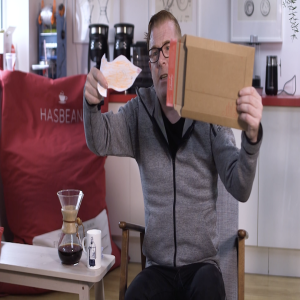
Saturday Feb 29, 2020
Episode 590: Bolivia Las Alasitas Washed Caturra
Saturday Feb 29, 2020
Saturday Feb 29, 2020
Las Alasitas is the biggest farm of Fincas Buena Vista in Caranavi where, every year, a festival is held in honour of Ekeko (iqiqu), the god of abundance. It has everything in miniature – but in abundance, just like him!
'Buy me!' said Alasitas. And well, we did! It's all in the name...
Las Alasitas (which literally translates to 'buy me' in Aymaran) is owned by the Rodriguez family, who have been doing some awesome things for coffee in Bolivia. They own their own mills, processing and exporting coffee for farmers in the Caranavi and Sud Yungas region. The family has been sourcing coffee from small coffee producers for three decades, but the steady decline of coffee production has put the sustainability of their export business in jeopardy. Without the intervention of people like the Rodriguez family, the future of coffee production in Bolivia is at risk of disappearing.
Back in 2014, the Rodriguez family bought land in the Caranavi region to showcase their practices and educate other producers in sustainable farming, as well as increasing the overall volume at their mills.
Caranavi is located just north of the department of La Paz city, 150 kilometres from the capital, and is the central hub of Bolivian coffee production. Its altitude and fertile soils make it perfect for producing brilliant and unique coffees.
The Rodriguez family prepared the land they bought across 20.6 hectares, where they planted Red Caturra, Java and Geisha. They’ve also introduced a sustainable model for the producers who supply them at their mill. They built this on three mantras: economical sustainability, social understanding, and environmental awareness – the Sol de la Mañana program.
The family decided that they could make a change and make things better. They have taken on the challenge of increasing the production of Bolivian coffee by planting their own new coffee plantations. They are currently also developing woodland on their farm to combat the ongoing issue of deforestation. What superstars!
Las Alasitas is a 20.6-hectare farm that's located at 1,550 metres above sea level in the Bolinda colony of Caranavi, Bolivia. Of those 20 hectares, 16 are used to grow coffee.
What a juicy coffee! It's smooth and silky in texture with a really upfront fruit sweetness, whilst the acidity is quite delicate. The fruit flavours shift as it cools, but I get sweet satsumas and a hint of passionfruit before swinging into peach on the aftertaste.
- Country: Bolivia
- Region: Yungas
- Municipality: Caranavi
- Colony: Bolinda
- Farm: Las Alasitas
- Altitude: 1,550 m.a.s.l.
- Farm size: 20.6 hectares
- Coffee growing area: 16 hectares
- Varietal: Caturra
- Processing method: Washed
- GPS: 15º46'43.07"S 67º32'53.06"O
CUPPING NOTES
Satsuma, passionfruit, peach
Clean cup (1–8): 6.5
Sweetness (1–8): 8
Acidity (1–8): 6
Mouthfeel (1–8): 6.5
Flavour (1–8): 6.5
Aftertaste (1–8): 6
Balance (1–8): 6
Overall (1–8): 6.5
Correction (+36): +36
Total: (max. 100): 88
Roasting Information
Medium-dark - keep a nice steady pace and you're looking for the very first pops of second in the cooling tray, no more!
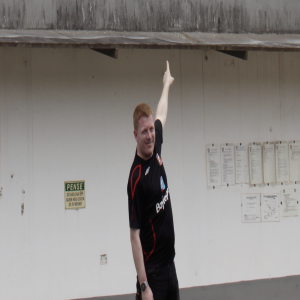
Saturday Feb 22, 2020
Episode 589: Brazil Fazenda Cachoeira da Grama Pulped Natural Yellow Bourbon
Saturday Feb 22, 2020
Saturday Feb 22, 2020
This farm and its coffee sparked a massive change in what I thought I knew about coffee. I remember the first time I ever cupped this coffee: time stood still as the cup opened my mind to what great coffee is and can be. Gabriel de Carvalho Dias, the farmer, continues to produce great coffee year on year, and this coffee still holds a very special place in my heart.
Gabriel is one of Brazil’s leading agronomists. His family owns several farms, all of which border one another. Fazenda Cachoeira da Grama is 417 hectares in size – that’s 4 square kilometres! That sounds huge, but it’s not uncommon for farms to be more than 1,000 hectares.
Because of the mountainous terrain, however, only 64 hectares are planted with coffee, and it's all picked and maintained by hand. The mill is located close to the spa town of Poços de Caldas, which is 45 minutes away from the farm.
Fazenda Cachoeira da Grama has been in the Carvalho Dias family since 1890. It's located in São Paolo state, just three miles from the border with Minas Gerais state. It enjoys the typical characteristics of the mountainous Mogiana and Sul de Minas regions, and it's located at an altitude of 1,100–1,250 metres above sea level.
Their farm has a school, a club and a full-sized soccer field for the employees and workers, and 47 houses – all with modern facilities. The wastewater is treated in order to avoid polluting the stream that runs across the farm. The farm has a small hydroelectric plant, and the farmers only buy energy during the peak harvest.
As well as providing support to the workers, the family have also invested in the farm's coffee processing facilities. This has allowed them to produce one of the most consistent and delicious coffees. They grow mostly Yellow Bourbon, but also Canario and Mundo Novo. It's well-established plant stock, and some of the original Bourbon varietal trees are as much as 108 years old.
They’ve also invested in trying new things, including planting some new varietals and trialling new fermentation experiments with the involvement of experts from the University of Lavras (UFLA) in Minas Gerais.
The Carvalho Dias family consider social and environmental sustainability to be very important. The farm has a programme of planting native species of trees to maintain a better ecological balance.
This is a true classic for us. Once again this year it brings the milk chocolate and hazelnut that will be familiar to many of you! There's a little drizzle of caramel in there too, and a tiny shoulder of dried apricot on the finish. It's got a lovely texture that combines with the nuttiness to make me think of almond butter.
- Country: Brazil
- State: São Paulo
- Municipality: São Sebastião da Grama
- Farm: Fazenda Cachoeira da Grama
- Owner: Lidolpho de Carvalho Dias and family
- Altitude: 1,100–1,250 m.a.s.l.
- Processing: Pulped Natural
- Varietal: Yellow Bourbon
CUPPING NOTES
Milk chocolate, hazelnut, caramel, dried apricot, almond butter
Clean cup: (1–8): 6
Sweetness: (1–8): 7
Acidity: (1–8): 6
Mouthfeel: (1–8): 7
Flavour: (1–8): 6.5
Aftertaste: (1–8): 6
Balance: (1–8): 6.5
Overall: (1–8): 7
Correction: (+36): +36
Total (max. 100): 88
Roasting Information
Medium-dark – plenty of development and take it through the gap, but don't take this coffee into second.

Friday Feb 14, 2020
Episode 588: Guatemala El Limon Washed San Ramon
Friday Feb 14, 2020
Friday Feb 14, 2020
Due to a multiple hard disk drive failure, the original recording for this episode we sadly lost : ( however all was not lost! Steve and our friends at Tentacle Media worked over the weekend to record and edit a new recording and so without further ado, here we go!
I first discovered El Limon on my trip to Guatemala in early 2013. At the time we'd never bought coffee directly from Guatemala, but since then this has become one of our strongest and most amazing Hasrelationships.
My friend Raul (whom you may remember as the World Barista Champion of 2012!) in Guatemala had been buying coffee from these guys for a couple of years, and he was very keen for me to go and meet them. Located around an hour's drive to the east of Guatemala City in the small town of Palencia, this farm sits at an altitude between 1,600 and 1,800 metres above sea level. It's owned by Guadalupe Alberto Reyes, who's also just known as Beto. He used to be the Mayor of Palencia, and he helped to build and develop the town.
Palencia is not part of the eight regions of coffee as defined by Anacafé, but you can see a lot of development in the zone, and this farm is a perfect example of that development. I like being in places that are working to be hot and up-and-coming, as well as those that are established players.
One of the main reasons I love El Limon is Beto's desire to experiment; the farm mostly produces Bourbon and Caturra, but he also plays around with a few other varietals. The experimentation is thanks to Beto's motivation; he has really focused on the farm over the last few years. He wanted to take more care in every step they take – from picking to processing, to shipping – and also take more care in the agronomy of the farm.
This is very much a family affair: his wife and son also work on the farm, along with Beto's siblings. In fact, his son is studying agronomy at the local college for the benefit of the farm.
The dedication and care devoted to each step of production is reflected in the fact that the family has built a new wet mill, so that they can separate different lots and have control over the quality of the coffee. Previously the mill could process only one lot; now the farmers are able to process many lots, and keep separate days' pickings and varietals in their own parcels.
With this wet mill came another opportunity, which was for neighbours and people within the region of Palencia to bring their coffees to the mill where they could get them processed. It's another sign that this is a hot spot for Guatemalan coffee.
As time moves on, Beto doesn't want to stand still and is continuing to invest in the farm. He showed me lots of new planting during my recent visit, and a lot of building work around the wet mill. He is also building a QC lab and new accommodation for people working on the farm. It was a real hive of activity.
Beto and his family have always been the perfect hosts whenever I visited the farm. They are such welcoming people and take great pride in showing me around their farm. One of the kindest things they've done for me is to welcome me into their home when I am visiting, and they always prepare the most amazing meals! When you travel as much as I do, mid-trip you find yourself longing for something big, home-cooked, and not from a restaurant or roadside pop-up cafe. Traditional Guatemalan meals are just the ticket, and I always look forward to the food – but mainly I look forward to the company.
The Milky Bars are on me! Yep, it's a creamy, chocolatey cup that makes for great chugging coffee. There's a delicate acidity that reminds me of pear, and there's a little almond on the finish too.
- Country: Guatemala
- Region: Palencia
- Farm: El Limon
- Farmer: Guadalupe Alberto 'Beto' Reyes
- Altitude: 1,600 m.a.s.l.
- Varietal: San Ramon
- Processing method: Washed
CUPPING NOTES
Milky Bar, pear, almond
Clean cup: (1–8): 6
Sweetness: (1–8): 7
Acidity: (1–8): 6
Mouthfeel: (1–8): 6
Flavour: (1–8): 6.5
Aftertaste: (1–8): 6
Balance: (1–8): 6.5
Overall: (1–8): 6.5
Correction: (+36): +36
Total: (max. 100): 86.5
Roasting Information
Medium-dark – through first, keeping a nice steady pace and looking for those first pops of second as you drop the coffee into the cooling tray.

Saturday Feb 08, 2020
Episode 587: Bolivia Las Alasitas Washed Longberry
Saturday Feb 08, 2020
Saturday Feb 08, 2020
Las Alasitas is the biggest farm of Fincas Buena Vista in Caranavi where, every year, a festival is held in honour of Ekeko (iqiqu), the god of abundance. It has everything in miniature – but in abundance, just like him!
'Buy me!' said Alasitas. And well, we did! It's all in the name...
Las Alasitas (which literally translates to 'buy me' in Aymaran) is owned by the Rodriguez family, who have been doing some awesome things for coffee in Bolivia. They own their own mills, processing and exporting coffee for farmers in the Caranavi and Sud Yungas region. The family has been sourcing coffee from small coffee producers for three decades, but the steady decline of coffee production has put the sustainability of their export business in jeopardy. Without the intervention of people like the Rodriguez family, the future of coffee production in Bolivia is at risk of disappearing.
Back in 2014, the Rodriguez family bought land in the Caranavi region to showcase their practices and educate other producers in sustainable farming, as well as increasing the overall volume at their mills.
Caranavi is located just north of the department of La Paz city, 150 kilometres from the capital, and is the central hub of Bolivian coffee production. Its altitude and fertile soils make it perfect for producing brilliant and unique coffees.
The Rodriguez family prepared the land they bought across 20.6 hectares, where they planted Red Caturra, Java and Geisha. They’ve also introduced a sustainable model for the producers who supply them at their mill. They built this on three mantras: economical sustainability, social understanding, and environmental awareness – the Sol de la Mañana program.
The family decided that they could make a change and make things better. They have taken on the challenge of increasing the production of Bolivian coffee by planting their own new coffee plantations. They are currently also developing woodland on their farm to combat the ongoing issue of deforestation. What superstars!
Las Alasitas is a 20.6-hectare farm that's located at 1,550 metres above sea level in the Bolinda colony of Caranavi, Bolivia. Of those 20 hectares, 16 are used to grow coffee.
As far as we can tell, the Longberry varietal (also known as Java) is a Typica-type coffee because of its bean shape, as is the Geisha. Its physical appearance is a uniform seed that is elongated, and it has been described by several of our customers as an 'Ethiopian Long Berry type'.
A true marriage of classic flavours, from the Longberry varietal you'll get a hit of lemon zest and florals, but the Bolivian land it's grown on gives it extra depth and sweetness and reminds me of golden sugar. It finishes with a return to its distant Ethiopian heritage with a clean black tea flavour.
- Country: Bolivia
- Region: Yungas
- Municipality: Caranavi
- Colony: Bolinda
- Farm: Las Alasitas
- Altitude: 1,550 m.a.s.l.
- Farm size: 20.6 hectares
- Coffee growing area: 16 hectares
- Varietal: Longberry (Java)
- Processing method: Washed
- GPS: 15º46'43.07"S 67º32'53.06"O
CUPPING NOTES
Lemon zest, floral, golden sugar, black tea
Clean cup (1–8): 7
Sweetness (1–8): 7
Acidity (1–8): 7
Mouthfeel (1–8): 6
Flavour (1–8): 8
Aftertaste (1–8): 6
Balance (1–8): 6
Overall (1–8): 7
Correction (+36): +36
Total: (max. 100): 90
Brewing Tip
As this berry is long it will benefit from a slightly finer grind than you would use for a more regularly sized bean. Not as much as you would change things up for something like a Pacamara, but a little tweak finer should set you up for deliciousness.
Roasting Information
Medium - slow this down a little as you go through first and push it through the gap, but don't let it get close to second.

Saturday Feb 01, 2020
Episode 586: El Salvador Finca Las Brumas Washed SL28
Saturday Feb 01, 2020
Saturday Feb 01, 2020
Juan Jose Ernesto 'Neto' Menéndez Argüello belongs to the fourth generation of coffee farmers in his family. His father died in 1995. After completing his studies at university, Neto had the opportunity to start working in the coffee industry at J. Hill & Cia, in 2000. He left J. Hill & Cia after five years and began his second coffee experience at JASAL.
Both companies gave him the opportunity to meet 'Grano de Oro' from another perspective, allowing him to learn the art and passion of cupping. He says those are very important in his life, and that they give him the opportunity to apply his coffee knowledge and experience that he's gained through the years.
During his time in the coffee world, he has participated in various events like the Cup of Excellence (National Jury from 2003 to 2011), Q Auction, Q Grader, and the Star Cupper program organised by SCAA and CQI.
Las Brumas is located between 45 to 60 minutes from Santa Ana city. It has a cultivated area of 60 hectares' worth of coffee yield, all of which is at an altitude ranging from 1,450 to 1,700 m.a.s.l. It produces around 600 bags of coffee each year, and has an area of 35 hectares of virgin mountain at an altitude from 1,700 to 2,000 m.a.s.l.
The farm is located in the Sonsonate department near the area known as San Blas. Las Brumas has very rich volcanic soil, deep and very fertile, which has been generated by different Ilamatepec and Izalco volcanic eruptions throughout its history.
One of the most important elements is the microclimate. It's very misty at the farm for most of the year, and that's why Neto decided to name the farm Finca Las Brumas. This amazing micro climate is generated when the warm air from the Pacific ocean collides with the high peaks of the Volcanoes Park (which comprises of the Santa Ana, Cerro Verde and Izalco volcanoes).
Due to its location between these three famous volcanoes in El Salvador, this unique microclimate reduces the amount of daylight that the coffee trees receive. This helps the coffee trees have a very slow photosynthesis, improving the maturation process, and this, in turn, improves some attributes that are closely related to maturity, like the aroma, sweetness, acidity and flavour.
Sultana and lemon both jump out from this cup, but with a drizzle of a dark caramel coming through and adding an extra complexity to the fruit sweetness. As it fades, there's a hit of dark chocolate which lingers into the aftertaste.
- Country: El Salvador
- Department: Sonsonate
- Nearest city: Santa Ana
- Farm: Finca Las Brumas
- Producer: Juan Jose Ernesto 'Neto' Menéndez Argüello
- Varietal: SL28
- Processing system: Washed
- Altitude: 1,450–1,700 m.a.s.l.
- Type of soil: Sandy loam
- Average rainfall: 2,400mm
- Types of shade: Ingas, sunk, cipers and belloto
- Flora and fauna present: Mountain trees, wildflowers, deer, squirrels, armadillos, snakes
CUPPING NOTES
Sultana, lemon, dark caramel, dark chocolate
Clean cup: (1–8): 6.5
Sweetness: (1–8): 6
Acidity: (1–8): 6.5
Mouthfeel: (1–8): 6
Flavour: (1–8): 7
Aftertaste: (1–8): 6.5
Balance: (1–8): 6.5
Overall: (1–8): 7
Correction:(+36): +36
Total: (max. 100): 88
Roasting Information
Medium-dark - get this through the gap between cracks and slow it down a little, you're looking to catch the very early edge of 2nd as the roast drops out of the roaster.
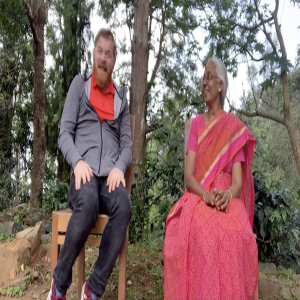
Saturday Jan 25, 2020
Episode 585: India Balmaadi Biodynamic Natural
Saturday Jan 25, 2020
Saturday Jan 25, 2020
We first came across Balmaadi Estate in India many years ago and loved the coffees. You did too, so it was really disappointing when we weren’t able to get hold of them any more.
Fast forward 9 years and we’ve been able to get it here again! It wasn’t an easy process, but it’s been a huge pleasure to see an old favourite return. More than that though, this time round we’ve been able to visit the farm and learn more than ever before about this unique place and what makes it so special.
As is so often the case, what makes it so special turns out to be the people. Balmaadi, as we know it today, owes a huge amount to one person - Unnamalai Thiagarjen. The farm had been in her husband’s family since the 1970s, but it was in 2003 that she took over running it. Totally new to coffee farming, she went off and studied, beginning to worry about how to make profitable a traditional farm in a region which is frequently cut off from access by monsoon weather. She realised that the fertilisers and pesticides most commercial farms used would be difficult to get and need lots of labour to apply (equally difficult in a remote region like this).
It was then that she came across the Biodynamic model, which she applied ever after. Combining Organic principles with spiritual ones, she’s made the most of her isolated location. This means making their own compost, foliar sprays and other treatments from the other plants and material on the farm. It was a great idea to take a challenge and make it into an opportunity - which in turn has produced an interesting and unique coffee.
They grow two varietals - Kent and S795. Both of these are common to India, but less common in other countries. Kent is a Typica mutation which is thought to have occurred in the early 20th Century in India, before being introduced in Kenya (where it has lost popularity to the SL varietals and Ruiru 11). S-795 is thought to be a cross of Kent with a Liberica/Arabica hybrid called S-288 (catchy name, right?) and has become popular in India and Indonesia for being quite resistant to Leaf Rust.
A big, gloopy coffee with loads of sultana and a sweetness which reminds me of marzipan. There's a little cherry jam in there too, which makes for a delicious and interesting balance. As it cools, the booziness really comes centre stage with a big hit of Armagnac.
- Country: India
- State: Tamil Nadu
- Region: Nilgiris
- Farm: Balmaadi Estate
- Owner: Unnamalai Thiagarajen
- Varietals: Kent and S795
- Process: Natural
- Certification: Biodynamic
- Drying Method: Patios and African beds
- Altitude: 1,200-1,830 m.a.s.l
- Farm size: 169 hectares, of which 148 hectares are coffee
CUPPING NOTES
Sultana, marzipan, cherry jam, Armagnac
Clean Cup: (1-8): 6
Sweetness: (1-8): 6.5
Acidity: (1-8): 6
Mouthfeel: (1-8): 6.5
Flavour: (1-8): 7
Aftertaste: (1-8): 6
Balance: (1-8): 6.5
Overall: (1-8): 6.5
Correction:(+36): +36
Total: (max. 100): 87
Roasting Information
Medium-dark - this needs to be pushed pretty hot to get the right level of development, just up to the first pops of second.

Saturday Jan 18, 2020
Episode 584: Guatemala Finca La Soledad Washed 90-Hour Fermentation Caturra
Saturday Jan 18, 2020
Saturday Jan 18, 2020
Raul Perez has grown up around coffee, he comes from a fifth-generation coffee farming family on his father's side, and a third-generation family on his mother's side. Coffee has always been part of his life. He has told me about the stories his grandparents would share with him about their experiences.
But I think it's fair to say that Raul has made plenty of his own coffee stories in his ten years of involvement in the specialty coffee industry.
It was ten years ago when Raul first became involved in the family business. After living in Guatemala City in his youth (so he was able to go to a good school and university), he returned to the farm where his family had still been working and commuting.
This coincided with a visit from an international buyer who made the family view coffee production in a different way. The speciality market was blossoming and the visitor gave them new ideas for varietals, picking, and processing that changed the direction of their farm and their cup quality. As Raul puts it, they began to work in a "more interactive way".
Finca La Soledad has been a Pérez family coffee farm since 1895, the farm is located in Acatenango, near to the Acatenango volcano. It has a great microclimate and an altitude of 1,650 metres above sea level.
The Pérez family invested heavily in their mill, rebuilding it with the environment in mind. They have a clever system through which they are able to recycle the water they use for processing many times.
The first time I met Raul was at a friend's wedding in Guatemala. I didn't know him (like most of the other guests), but we got talking and I enjoyed his company. At no time did he try to push his coffee on me, and I think only in passing did he say his family worked in coffee. Raul was so kind he offered to take us back to our hotel that evening to save us having to get in a dodgy cab in Guatemala City.
I have an exporting partner in Guatemala who sent me an amazing sample, which I decided there and then we had to but. I was only after I committed to buying the coffee that I found out it was from Raul's farm. Since then I've been lucky enough to visit the farm and meet the whole family. A fond memory that will stay with me is sitting on the unused drying patio with them all, enjoying a beer and watching the sun go down. They are a professional team and a lovely, warm family.
Our coffees from La Soledad are washed coffees - meaning they are soaked in water to remove the fruit from the beans. This fermentation process plays a key part in developing the flavours that make a great coffee something special. It’s a super interesting (and complex!) part of the beans journey from the plant to us and one which clever producers like the Perez family are really starting to explore and experiment with.
After picking, the cherries went into a steel tank with cold water. Raul controls the temperature whilst the coffee is fermenting as he found that by keeping it cooler he could allow the coffees to ferment for longer without any off flavours developing.
You want to know something else cool about La Soledad, they have an Instagram page! And they're really active on there too so go have a look at what they're up to https://www.instagram.com/fincalasoledad
I love it when a coffee tastes like a mug of cocoa, but this one takes it one stage further and tastes like you're dunking Oreos in you cocoa! It's all wrapped up by a creamy texture and a hint of red apple peel on the finish, but this is one for the chocolate lovers.
- Country: Guatemala
- Region: Acatenango
- Farm: La Soledad
- Farmer: Raul Perez and family
- Altitude: 1,500 m.a.s.l.
- Variety: Caturra
- Processing system: Washed
- Fermentation method: 90-hour
CUPPING NOTES
Hot chocolate, Oreos, red apple peel.
Clean cup (1–8): 7
Sweetness (1–8): 6.5
Acidity (1–8): 6
Mouthfeel (1–8): 6.5
Flavour (1–8): 6.5
Aftertaste (1–8): 6
Balance (1–8): 6.5
Overall (1–8): 7
Correction (+36): +36
Total: (max. 100): 88
Roasting Information
Medium dark - just through the gap between cracks and up to the start of second crack but don't let it get going.
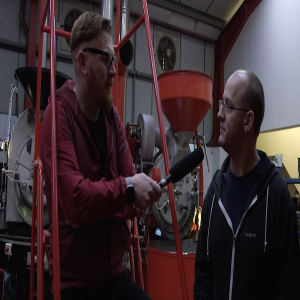
Saturday Jan 11, 2020
Episode 583: Bolivia Teodocio Mamani Organic
Saturday Jan 11, 2020
Saturday Jan 11, 2020
I first met Teodocio Mamani on my visit to Bolivia in 2012. Long story short: he's an amazing guy. We got talking about the photo we had of him in a Chelsea shirt, and then, of course, we started talking football. He had the Chelsea shirt because he played for a local team that played in blue, but I managed to convince him that he needed a shirt from a real team – so I sent him a Sunderland shirt!
Teodocio's farm sits in the municipality of Canton Uyunense in Caranavi, and is a mixed lot of red and yellow Catuai. Teodocio also has one hectare of land on his farm that is a natural forest reserve, in which he owns a house where he lives with his wife and two children.
Teodocio processes the majority of his coffee on his own farm. He uses a depulper that removes the cherry, then leaves the cherry to go through a dry fermentation process (anaerobic) for sixteen hours, and then runs it through the scrubber section of the pulper to remove the final remains of the mucilage. He then transfers the coffee to raised African beds, where it dries in around twelve days (depending on local weather conditions).
Like a number of the producers we work with, Teodocio is organic certified, but we haven't been able to sell his coffee as organic in previous years because we at Has Bean weren't certified. But 2019 is different, my friends: we're now organic certified (biodynamic coming soon too!). So we can gloriously now offer this coffee from Teodocio as organic, thanks to our own shiny new organic certificate.
I was talking to the exporter about Teodocio's picking methods, and he was explaining that the family uses a method called 'Ayne'. With this method the most mature fruits are harvested each day by hand, demanding the labour of 8–10 people (who are all Mamani family members) to pick selectively and correctly. But because of this he gets more coffee that he can sell as specialty grade, and the cup profile improves too. Teodocio is just as passionate about improving the cup quality as he is about his football!
Chocoholics, come on down! This one's just dark chocolate through and through. There's a little hit of cranberry, followed by a whisper of lime zest on the finish, but throughout it all the rich dark chocolate is the star.
- Country: Bolivia
- Region: Yungas
- Province: Caranavi
- Municipality: Canton Uyunense
- Farm: Teodocio Mamani
- Varietal: Caturra and Catuai
- Ripe cherry colour: Red and yellow
- Altitude: 1,600–1,750 m.a.s.l.
- Processing method: Mechanically Washed
- Fermentation method: Dry (anaerobic)
- Fermentation time: 16 hours
- Drying method: Raised African beds
- Drying time: 12 days
- Certification: Organic
CUPPING NOTES
Dark chocolate, cranberry, lime zest
Clean cup: (1–8): 6
Sweetness: (1–8): 6.5
Acidity: (1–8): 6.5
Mouthfeel: (1–8): 6.5
Flavour: (1–8): 6
Aftertaste: (1–8): 6.5
Balance: (1–8):
Overall: (1–8): 6.5
Correction: (+36): +36
Total (max. 100): 87.5
Roast Information
Medium-dark - this coffee isn't forgiving. It needs to go through first crack and then you need to slow it down. Get it up t the first pops of second to showcase the chocolate, but don't let second fully begin or it will burn quickly.
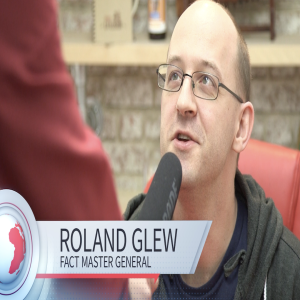
Saturday Jan 04, 2020
Episode 582: Guatemala El Limon Washed Bourbon
Saturday Jan 04, 2020
Saturday Jan 04, 2020
I first discovered El Limon on my trip to Guatemala in early 2013. At the time we'd never bought coffee directly from Guatemala, but since then this has become one of our strongest and most amazing Hasrelationships.
My friend Raul (whom you may remember as the World Barista Champion of 2012!) in Guatemala had been buying coffee from these guys for a couple of years, and he was very keen for me to go and meet them. Located around an hour's drive to the east of Guatemala City in the small town of Palencia, this farm sits at an altitude between 1,600 and 1,800 metres above sea level. It's owned by Guadalupe Alberto Reyes, who's also just known as Beto. He used to be the Mayor of Palencia, and he helped to build and develop the town.
Palencia is not part of the eight regions of coffee as defined by Anacafé, but you can see a lot of development in the zone, and this farm is a perfect example of that development. I like being in places that are working to be hot and up-and-coming, as well as those that are established players.
One of the main reasons I love El Limon is Beto's desire to experiment; the farm mostly produces Bourbon and Caturra, but he also plays around with a few other varietals. The experimentation is thanks to Beto's motivation; he has really focused on the farm over the last few years. He wanted to take more care in every step they take – from picking to processing, to shipping – and also take more care in the agronomy of the farm.
This is very much a family affair: his wife and son also work on the farm, along with Beto's siblings. In fact, his son is studying agronomy at the local college for the benefit of the farm.
The dedication and care devoted to each step of production is reflected in the fact that the family has built a new wet mill, so that they can separate different lots and have control over the quality of the coffee. Previously the mill could process only one lot; now the farmers are able to process many lots, and keep separate days' pickings and varietals in their own parcels.
With this wet mill came another opportunity, which was for neighbours and people within the region of Palencia to bring their coffees to the mill where they could get them processed. It's another sign that this is a hot spot for Guatemalan coffee.
As time moves on, Beto doesn't want to stand still and is continuing to invest in the farm. He showed me lots of new planting during my recent visit, and a lot of building work around the wet mill. He is also building a QC lab and new accommodation for people working on the farm. It was a real hive of activity.
Beto and his family have always been the perfect hosts whenever I visited the farm. They are such welcoming people and take great pride in showing me around their farm. One of the kindest things they've done for me is to welcome me into their home when I am visiting, and they always prepare the most amazing meals! When you travel as much as I do, mid-trip you find yourself longing for something big, home-cooked, and not from a restaurant or roadside pop-up cafe. Traditional Guatemalan meals are just the ticket, and I always look forward to the food – but mainly I look forward to the company.
The first thing that strikes me about this coffee is how well balanced it is. It starts with fruit sweetness and the flavour of sweet Golden Delicious apples. Then it shifts into brown sugar and hazelnut on the finish, and a sprinkle of cocoa on the aftertaste.
- Country: Guatemala
- Region: Palencia
- Farm: El Limon
- Producer: Guadalupe Alberto 'Beto' Reyes
- Altitude: 1,600 m.a.s.l.
- Varietal: Bourbon
- Processing method: Washed
CUPPING NOTES
Golden Delicious apples, brown sugar, hazelnut, cocoa
Clean cup: (1–8): 6
Sweetness: (1–8): 6.5
Acidity: (1–8): 6
Mouthfeel: (1–8): 6
Flavour: (1–8): 6.5
Aftertaste: (1–8): 6.5
Balance: (1–8): 7
Overall: (1–8): 6
Correction: (+36): +36
Total: (max. 100): 86.5
Roast Information
Medium-dark – through first crack and push this so you get the first pops of second as you drop, taking it far enough to let the complex sweetness shine whilst also keeping that balanced acidity.

Saturday Dec 28, 2019
Episode 581: Costa Rica Finca La Pira White Honey Catuai
Saturday Dec 28, 2019
Saturday Dec 28, 2019
La Pira is located in the high altitude Dota valley of the Tarrazu region: an area that's known for producing great coffees. This relatively young estate is only just over 50 years old and is owned by the founder’s son, Carlos Urena Ceciliano. He has worked on the farm for almost 20 years; however, he has worked in coffee all his life.
Coffee from La Pira first hit our radar back in 2009 thanks to the Cup of Excellence, and we were pleased to be reunited with the farm only recently after a lot of effort and hard work. A few years ago it was really rather tricky to get, stretching both Steve's pocket and patience, but it was well worth it. Thankfully all years after that it's been a little less stretchy!
After inheriting the family farm, Carlos worked for many years as a certified organic coffee producer, but he realised doing so was just not possible on this farm. Organic coffee is good, but not possible for everyone. The yield was very, very affected. So Carlos looked for alternatives, while still holding the organic principles very close to his heart. For instance, instead of using chemicals to control the weeds, sheep roam freely amongst the coffee plants and eat the weeds (and strangely leave the coffee plants alone). They work as automatic and mobile 'fertilisation units' (nature’s a wonderful thing). This has eliminated the need for herbicides. This is the kind of thinking Carlos has about coffee.
When Steve last visited La Pira, Carlos told him about how he wakes up in the middle of the night with an idea of how he can improve production, change the way the coffee is harvested and processed, or how systems can be improved upon. Steve too isn't the best sleeper and often suffers from this type of sleep deprivation relating to ideas popping into his head, so it was something that he could really empathise about.
During one of these late-night bursts of inspiration, Carlos thought that using the coldest water he could would be the best way of processing the cherry. During the night the Dota Valley gets a really sharp, cold breeze, and it runs through the whole farm. He had noticed the way the water on the mill roof, which sprinkled from processing, was almost frosting up. So he created a sprinkling system and a zinc ramp that the water runs across before hitting the cherries in the fermentation tank.
We've chased coffee from La Pira ever since we first had it all those years ago in 2009. Some years it's been super tough to get our hands on due to low yields and some other things, but via quite a bit of pestering the exporter we partner with in Costa Rica we've always managed to get our way!
You might have already noticed that we've got a different varietal and processing method combo from La Pira this year, in the past we've always had red honey processed Caturra but for 2019 we've got a white honey processed Catuai. Carlos does a really wide range of processes and a range of different varietals - during our las Hasvisit to Costa Rica, we cupped quite a few lots from the mill and this particular lot really stood out in blind cupping as being especially elegant, complex and just super delicious (and scored a point or so higher than the other lots we cupped). It just so happened this was this white honey Catuai rather than the usual red honey Caturra - one of the many reasons for going all the way to Costa Rica each year! : )
Expect an intensely sweet coffee, jam-packed full of fruit and white sugar. It's super complex, with hints of passionfruit and fresh blueberries alongside a delicate sherry note. On the aftertaste, this really shines as it just keeps on going and going, with papaya joining in. Overall, this is wonderfully balanced and one that you'll get something different from each sip.
- Country: Costa Rica
- Region: Tarrazú
- City: Santa María de Dota
- Farm: Finca La Pira
- Farmer: Carlos Ureña Ceciliano
- Farm size: 7 hectares
- Altitude: 1,650 m.a.s.l.
- Variety: Catuai
- Processing system: White Honey
CUPPING NOTES
White sugar, passionfruit, fresh blueberries, sherry, papaya
Clean cup: (1–8): 6.5
Sweetness: (1–8): 8
Acidity: (1–8): 6
Mouthfeel: (1–8): 6
Flavour: (1–8): 7
Aftertaste: (1–8): 8
Balance: (1–8): 7
Overall: (1–8): 6.5
Correction: (+36): +36
Total: (max. 100): 91
Roasting Information
Medium - keep this gentle, get through first crack, a little time in the gap then drop well before you approach second.

Saturday Dec 21, 2019
Episode 580: Festive Blend
Saturday Dec 21, 2019
Saturday Dec 21, 2019
The Hasbean festive tradition continues for its fourteenth year. Iiiiiiiiit's Chriiiiiiistmaaaaaaaas!
Each and every year since 2006 we've released Christmas blends to celebrate this wonderful time of year.
In previous years we've had separate filter and espresso blends, but for 2019 we're doing something different. This year there's just one blend that's designed to deliver a delicious cup of festive filter or seasonal espresso to help keep you going this December.
We don't roast our coffee for particular brew methods here at Hasbean. Instead, we take the roast to a place where we feel it really shines across all brew methods. We wanted 2019's Festive Blend to really show off this approach to roasting.
This blend will only be roasted throughout the month of December. It will disappear at the start of January – some fella in a red suit (no, not Steve!) said so.
So make sure to enjoy it while you can!
- 50% El Salvador Finca San José Washed Red Bourbon
- 30% Guatemala El Limon Natural Bourbon
- 20% Ethiopia Ana Sora Natural
The inspiration for our festive blend was the Christmas Pudding – and we think you’ll be able to tell. It’s sweet and sticky with dried fruit and brown sugar. We’ve departed from the traditional with a little glacé cherry in there too. It's all wrapped up with a sweet boozy hit of Grenadine.
CUPPING NOTES
Christmas pudding, sultana, glacé cherry, grenadine
Espresso Recipe Recommendation
Dose: 18.5g
Yield: 40g
Time: 35–38 seconds
Resting Recommendation
We recommend a 5-7 day rest after the date of roasting before brewing this coffee as espresso, but there's a lot of personal preference in that so, by all means, please brew whenever you like!
Roasting Information
Medium-dark – through first crack and then slow this down a little.You're looking to finish the roast around the end of the gap.
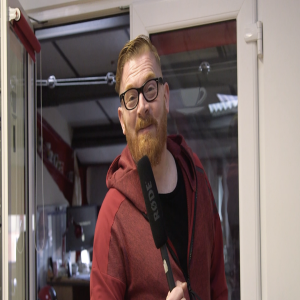
Saturday Dec 14, 2019
Episode 579: Kenya Muiri Estate AA Washed Organic
Saturday Dec 14, 2019
Saturday Dec 14, 2019
The Muiri Estate was founded in the late 1970s and is named after a local species of tree called pruners in the local Kikuyu language. Owned by the Mugiai family, Muiri is a rather big estate at 180 hectares with an on-site wet mill for processing, a dam and storehouse.
There are a whopping 156,000 trees producing coffee on the estate and they are predominantly a mix of SL28, SL34, K7 & Ruiru 11 - however, the estate is actively experimenting with other varietals and crops too, doing their best to be ready for the ever-changing climate and the challenges it brings with it.
The use of pesticides in Kenya is quite common but often a necessity to protect the trees from insect attacks, coffee diseases, funghi and the dry Kenyan climate. Over the last couple of years, Kenyan coffee production has been impacted by coffee berry disease (also known as CBD) and some really tough weather conditions.
Because of these things, we feel it's super important to be supporting an estate like Muiri as they're doing things differently to the rest (and we love different!). Production at the Muiri Estate is a lot more complex than many other farms in Kenya as they work completely organically, the Mugiai family are looking after their trees and estate incredibly carefully, for example manually pruning and stumping the trees regularly.
After the coffee is processed at the estate, it is separated by the size of the beans, AA, AB and PB. This is the biggest selection of the crop, which in Kenyan coffee grading is called AA.
This is zingy and sweet, a super clean and refreshing cup. Upfront I get white sugar with grapefruit and a little lime zest. There's a shoulder of gooseberry in there too, with a hit of blackcurrant really coming through on the finish and aftertaste.
- Country: Kenya
- Province: Central
- District: Thika
- Estate: Muiri Estate
- Altitude: 1,530 m.a.s.l.
- Producer: Mugiai Family
- Process: Fully washed
- Fermentation time: 48-72 hours
- Drying method: Raised beds
- Drying time: 15-21 days
- Varietals: SL28, SL34, K7 & Ruiru 11
- Grade: AA
- Certification: Organic
CUPPING NOTES
White sugar, grapefruit, lime zest, gooseberry, blackcurrant
Clean cup: (1–8): 7
Sweetness: (1–8): 7
Acidity: (1–8): 7
Mouthfeel: (1–8): 6
Flavour: (1–8): 6.5
Aftertaste: (1–8): 6
Balance: (1–8): 6
Overall: (1–8): 6.5
Correction:(+36): +36
Total (max. 100): 88
Roast Information
Medium – keep it pretty quick - through first, let it develop a little and aim to drop the roast towards the end of the gap but before second crack kicks off.
Brewing Tip
We're noticing that this coffee can tend to extract very easily versus others we are currently roasting. We recommend either a coarser grind than normal, shorter overall brewing time or lowering the amount of coffee you normally use to make a brew - our standard recommendation is 60g/l but try 55g/l and see what you think.
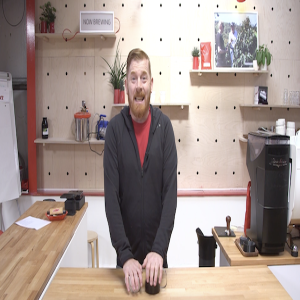
Saturday Dec 07, 2019
Episode 578: El Salvador Finca Las Brumas Washed Pacamara
Saturday Dec 07, 2019
Saturday Dec 07, 2019
This is an exclusive coffee only sent to In My Mug subscribers on December the 6th, 2019. I like to spoil you lovely lot whenever I can, and this week is 1 of those weeks! Only enough of this coffee to send out to IMM subscribers, so you're getting all of it, but afraid there’s sadly none to buy :(
Juan Jose Ernesto Menéndez Argüello belongs to the fourth generation of coffee farmers in his family. His father died in 1995, and after completing his studies at university he had the opportunity to start working in the coffee industry at J. Hill & Cia in 2000. After five years he left J. Hill & Cia to begin his second experience at JASAL. Both companies gave him the opportunity to meet “Grano de Oro” from another perspective, allowing him to learn the art and passion of cupping. He says those are very important in his life, and that they give him the opportunity to apply his coffee knowledge and experience gained through the years.
During his time in the coffee world, Neto has participated in various events like the Cup of Excellence (National Jury from 2003 to 2011), Q Auction, Q Grader, and the Star Cupper program organised by SCAA and CQI.
The farm, Las Brumas, is located between 45 to 60 minutes from the City of Santa Ana. It has a cultivated area of 60 hectares' worth of coffee yield, all of which is at an altitude ranging from 1,450 to 1,700 m.a.s.l. It produces around 600 bags of coffee each year, and has an area of 35 hectares of virgin mountain at an altitude from 1,700 to 2,000 m.a.s.l.
The farm is located in the Sonsonate department near the area known as San Blas. Las Brumas has a very rich volcanic soil, deep and very fertile, which has been generated by different Ilamatepec and Izalco volcanic eruptions throughout its history.
One of the most important elements is the micro climate. It's very misty for most of the year, and that's why Neto decided to name the farm Finca Las Brumas. This amazing micro climate is generated when the warm air when the Pacific ocean collides with the high peaks of the Volcanoes Park (Santa Ana volcano, Cerro Verde volcano and Izalco volcano). Due to its location between these three famous volcanoes in El Salvador, this unique micro climate reduces the amount of daylight that the coffee tree receives. This helps the coffee tree to have a very slow photosynthesis, improving the maturation process, and this in turn improves some attributes that are closely related to maturity, like the aroma, sweetness, acidity and flavour.
This coffee was produced as part of the brand new and super exciting Las Brumas Wild Coffee Project, the project is to use land for coffee producing that's forest, but to do it in a thoughtful and careful way so as not to remove any of the flora and fauna and so the space remains primarily a forest. This affects the speed of the growth of the coffee (lots of shade) but also provides it with its own fertilisation system, with all the forest floor goodness, and the constant supply of twigs and leaves to continue to enrich the soil.
This is lemon, lemon and lemon. Not just sharp lemon juice, but lemon marshmallow sweetness and lemon zest too. There's a little cocoa powder on the aftertaste, but this is always The Lemon Show.
- Country: El Salvador
- Department: Sonsonate
- Nearest City: Santa Ana
- Farm: Finca Las Brumas
- Farmer: Juan Jose Ernesto Menéndez Argüello
- Altitude: 1,450 - 1,700 m.a.s.l. / 1,700 - 2,000 m.a.s.l.
- Variety: Pacamara
- Processing System: Washed
CUPPING NOTES
Lemon juice, lemon zest, cocoa powder.
Roasting Information:
Medium Dark - Keep a steady pace through crack and drop the roast just before second gets going.

Saturday Nov 30, 2019
Episode 577: Guatemala El Limon Washed Pacamara
Saturday Nov 30, 2019
Saturday Nov 30, 2019
I first discovered El Limon on my trip to Guatemala in early 2013. At the time we'd never bought coffee directly from Guatemala, but since then this has become one of our strongest and most amazing Hasrelationships.
My friend Raul (whom you may remember as the World Barista Champion of 2012!) in Guatemala had been buying coffee from these guys for a couple of years, and he was very keen for me to go and meet them. Located around an hour's drive to the east of Guatemala City in the small town of Palencia, this farm sits at an altitude between 1,600 and 1,800 metres above sea level. It's owned by Guadalupe Alberto Reyes, who's also just known as Beto. He used to be the Mayor of Palencia, and he helped to build and develop the town.
Palencia is not part of the eight regions of coffee as defined by Anacafé, but you can see a lot of development in the zone, and this farm is a perfect example of that development. I like being in places that are working to be hot and up-and-coming, as well as those that are established players.
One of the main reasons I love El Limon is Beto's desire to experiment; the farm mostly produces Bourbon and Caturra, but he also plays around with a few other varietals. The experimentation is thanks to Beto's motivation; he has really focused on the farm over the last few years. He wanted to take more care in every step they take – from picking to processing, to shipping – and also take more care in the agronomy of the farm.
This is very much a family affair: his wife and son also work on the farm, along with Beto's siblings. In fact, his son is studying agronomy at the local college for the benefit of the farm.
The dedication and care devoted to each step of production is reflected in the fact that the family has built a new wet mill, so that they can separate different lots and have control over the quality of the coffee. Previously the mill could process only one lot; now the farmers are able to process many lots, and keep separate days' pickings and varietals in their own parcels.
With this wet mill came another opportunity, which was for neighbours and people within the region of Palencia to bring their coffees to the mill where they could get them processed. It's another sign that this is a hot spot for Guatemalan coffee.
As time moves on, Beto doesn't want to stand still and is continuing to invest in the farm. He showed me lots of new planting during my recent visit, and a lot of building work around the wet mill. He is also building a QC lab and new accommodation for people working on the farm. It was a real hive of activity.
Beto and his family have always been the perfect hosts whenever I visited the farm. They are such welcoming people and take great pride in showing me around their farm. One of the kindest things they've done for me is to welcome me into their home when I am visiting, and they always prepare the most amazing meals! When you travel as much as I do, mid-trip you find yourself longing for something big, home-cooked, and not from a restaurant or roadside pop-up cafe. Traditional Guatemalan meals are just the ticket, and I always look forward to the food – but mainly I look forward to the company.
This is a mash-up of dark chocolate with sweet and zingy citrus. It starts with peach and lemon, but it picks up a little grapefruit on the finish. The background of dark chocolate sticks with it throughout.
- Country: Guatemala
- Region: Palencia
- Farm: El Limon
- Producer: Guadalupe Alberto 'Beto' Reyes
- Altitude: 1,600 m.a.s.l.
- Varietal: Pacamara
- Processing method: Washed
CUPPING NOTES
Dark chocolate, peach, lemon, grapefruit
Clean cup: (1–8): 6.5
Sweetness: (1–8): 6
Acidity: (1–8): 7
Mouthfeel: (1–8): 6
Flavour: (1–8): 6.5
Aftertaste: (1–8): 6.5
Balance: (1–8): 6.5
Overall: (1–8): 6
Correction: (+36): +36
Total: (max. 100): 87
Brewing Tip
Pacamaras have a very unique size, density and structure, so don't expect them to grind like any other coffee. I find going a little finer than I normally would and allowing more time for the grinder to get its teeth into the bigger beans often leads to delicious results.
Roasting Information
Medium-dark – keep the pace steady through the crack and look for the first pops of second as you finish the roast.
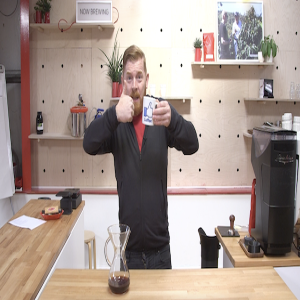
Saturday Nov 23, 2019
Episode 576: Nicaragua Finca Limoncillo Natural Red Bourbon
Saturday Nov 23, 2019
Saturday Nov 23, 2019
I've been telling the story of Hasbean and Finca Limoncillo for many, many years now. I don't intend to stop any time soon because it's such a big, big, big relationship for me. 😊
So much of where we are today has come from this relationship. I'm really proud of everything that's happened in the past, and super excited for where we can go in the future.
Our relationship with Finca Limoncillo began in 2007, and back then we were buying their delicious coffee as part of a buying group. I loved it from the very first time I cupped it, and it was a coffee I just had to get. It was only after the auction closed that I discovered it was owned by a family in Nicaragua who were already good friends of mine, and indeed probably the only people I knew from the whole country!
The following year I visited the farm with our importers, and I spent the whole trip begging them to bring the coffee into the UK for us. Eventually, thanks to my supreme Steve pester power, they caved in (probably just to stop the flow of emails and phone calls!) and kindly did so.
This setup worked well for a time, but we received notice a couple of years ago that the importers were not going to be buying the coffee again (and for reasons other than the cup quality). This led to some frantic phone calls and a thorough search down the back of the sofa for loose change to fund buying twelve months’ worth of coffee all at once. There were many, many obstacles in the way of doing this deal, but we were lucky in that we were able to pull everything together in a very short amount of time.
The upside of all of this is that we now work directly with Finca Limoncillo instead of going via anyone else, and this is a relationship I’m super happy to have. This coffee has gone from a one-off Cup of Excellence buy to a fantastic long-term relationship that I'm so very proud to have.
Finca Limoncillo is located in Matagalpa and, at 171 hectares in size, it. is. huge! Situated at an amazing location, it boasts nine waterfalls within the farm and is owned by the Mierisch family; as I have already said, they’re good friends, and also well-respected producers in Nicaragua. They’re known for their experimental processing, varietal work, and exceptional coffee.
The fact that the family are friends helps us drill down into the details of what they do for the people who work for them. The information continues to prove to me that good people grow good coffee.
This is lovely and balanced natural with plenty of currants and slices of dried apple upfront, before Muscovado sugar is liberally sprinkled over the top.
- Country: Nicaragua
- Municipality: Yasica Norte
- Region: Matagalpa
- Farm name: Limoncillo
- Producers: The Mierisch Family
- Farm size: 171 manzanas (hectares)
- Coffee growing area: 109 hectares
- Altitude: 1,200 m.a.s.l.
- Varietal: Red Bourbon
- Processing method: Natural
CUPPING NOTES
Currant, dried apple, Muscovado sugar
Clean cup: (1–8): 6.5
Sweetness: (1–8): 6.5
Acidity: (1–8): 6.5
Mouthfeel: (1–8): 6
Flavour: (1–8): 6.5
Aftertaste: (1–8): 6
Balance: (1–8): 6.5
Overall: (1–8): 6.5
Correction: (+36): +36
Total: (max. 100): 87
Roast Information
Medium - through first and slow it down just a little, dropping near the end of the gap or with the very first pops of second - no further!


